#but also give the audience a satisfying conclusion!
Explore tagged Tumblr posts
Text
Jurassic World: Chaos Theory spoilers:
(This is relevant to Star Wars I promise lol)
The ending of this season just makes Tech’s death that much more frustrating!!!
Like we, the audience, knew Brooklyn was alive, because that’s the way the story was set up. That’s the story we, as humans, like and understand and crave. We didn’t know when or how she was coming back, so it was still a surprise! And she lost an arm in the attack, so there were consequences! None of the tension or emotion was lost because she’s actually alive.
It just parallels Tech’s death so perfectly…except that in Chaos Theory they actually went with the story that both made narrative sense and satisfied the audience. There was still genuine pain and grief for her through the whole season, making her ‘death’ impactful (haha we didn’t even get that for Tech, so it was pretty much meaningless 🙃), but they’re still bringing her back into the story. It doesn’t feel forced or juvenile—it feels like the way the story is supposed to go.
It just feels like a kick in the teeth coming right on the heels of the end of TBB (mixing my metaphors a little lol) because yeah. This. This is exactly what I wanted: we get Tech back. He’s changed, irrevocably, but he’s back.
There just doesn’t feel like there was any point to Tech’s death except to hurt the audience—and it barely has any impact on the in-world story at all!!! A couple of almost throw-away lines over the whole third season. We don’t even see Crosshair finding out what happened.
TL;DR
The ending of the first season of Chaos Theory is exactly what I wanted to happen with Tech, and there’s no reason we shouldn’t have gotten him back.
#and they didn’t even let Echo have the moment under the tree with the rest of them!!!#I feel like I made some sort of devil’s bargain I wasn’t aware of lol#because I am genuinely SO HAPPY with how things turned out for Crosshair#like it is so much more than I had allowed myself to possibly imagine!!!#but it shouldn’t have cost Tech#(and Echo)#like there is no reason for it#you can build suspense and tension and still tell the story you want!#but also give the audience a satisfying conclusion!#(haha this isn’t even touching on Tech’s neurodivergence being acknowledged and then killing him off…!)#(but believe me I have Thoughts and Feelings about that too)#and I’d like to believe that there’s something new coming and maybe they’ll actually deal with some of the…rubble#but I don’t have that much faith I’m sorry#anyway#tbb#the bad batch#tbb tech#chaos theory spoilers#omfg
7 notes
·
View notes
Text
I was angry. I'm still angry. But sadness and exhaustion have overtaken that anger, and I have A LOT to say about this.
Dead Boy Detectives is a very special show to me. It occupies a ridiculously large place in my heart, and it's brought me joy in a way that only a few pieces of media ever have. When I watched it for the first time, Edwin Payne had my heart within minutes. By the end of episode one, Charles Rowland did, too.
It meant a lot to me, seeing such wonderful and nuanced queer characters brought to life in the type of paranormal story I have always loved. In these past months, Edwin and Charles have felt like real friends to me, and to never see them again without a satisfying conclusion to their story is something I have not truly processed. Same for Niko and Crystal and The Cat King - they should be back. But I haven't fully processed it yet, that they're not coming back, and yet I am still aggreived.
@netflix is, at this point, so fucking gagged on capitalism's dick that they're not even pretending to care about art anymore. Dead Boy Detectives is genuinely masterfully made on just about every level. The actors did a phenomenal job and I will be following all their careers heavily. Steve, Beth, and the writing team crafted an incredible tale. The sets, the lighting, the props, the effects were all on point. This was a well-constructed program, and you could tell that everyone involved with the project gave it their all because they cared so deeply.
(Also my heart breaks for the whole cast, but it's hardcore hurting for George since this was not only his first screen role but one he clearly thought he would be keeping as of two weeks ago. He seemed so secure. I hate this for him.)
In addition to being a good show, DBDA had good reception. It's got a 92% on Rotten Tomatoes, was on the Top 10 for several weeks, got 4.7 million views within week one, and was getting daily articles posted on various review sites with NOTHING but praise. The fandom is incredibly active. We trend on Tumblr like five times a week and on Twitter regularly as well.
THE. SCRIPT. FOR. SEASON. 2. WAS. WRITTEN.
What the fuck happened?
Idiot executives at @netflix, choking on the dick of capitalism, probably just thought that they wouldn't get new subscribers for a second season of an existing show that didn't rake in Bridgerton-level cash. That's how they work - people who are interested in it are already subscribers, so who the fuck cares about them? Better to make some other shit, hope new people subscribe, and maybe that'll be a Bridgerton-level hit.
But also, Netflix has fun little trends to look into. And, when you look at the lineup of shows Netflix has canceled, they are overwhelmingly queer. The homophobia of @netflix and their operatives is clearly boundless, and it hits here really badly because this show was clearly made with a queer audience in mind. It was one of the most authentic pieces of queer media I have ever experienced, if not THE most authentic pieces of queer media that I have ever experienced.
It's fucking ridiculous that Netflix canceled a show that they commissioned a completed script of months ago. It sucks that they decided that their existing subscribers, their queer subscribers, did not matter.
Edwin and Charles are ours now. Well, of course, they're George's and Jayden's respectively, but the characters are no longer Netflix's to use and throw out. They're ours now, our fandom's, and we all love them so much.
And we deserved to see more of them, and we deserved to see their love story play out onscreen, but I for one am not going anywhere. Let's give Edwin and Charles - and the rest of the gang - millions of versions of the stories and endings that Netflix deprived them of.
#dead boy detectives#dbda#im literally crying now#edwin payne#charles rowland#payneland#george rexstrew
445 notes
·
View notes
Text
I love villains, and I especially enjoy Brennan Lee Mulligan’s take on them. His version of Asmodeus in EXU Calamity and Downfall really highlights the reasons why.
A villain is the embodiment of the wrong conclusion. They aren’t always an antagonist; they aren’t necessarily meant to obstruct the protagonist of a story. Hell, they might even be helpful. Villains don’t even have to be evil, per se, they just have to be on the wrong path in the context of the story.
Asmodeus is a brilliant villain and as evil as it gets. He’s the Father of Lies, and he indulges in it deliciously. The lies are always half truths so that the protagonist fills in the blanks with assumptions and gets it wrong. He matches their energy to give them what they want to hear. He plays along with naivety and hope. He doesn’t take anything from people other than lives; they give the rest willingly because they want to believe him. Asmodeus finally reveals his deception when he has someone cornered because he wants them to know they did it to themselves. Asmodeus wants everyone he hurt to come to the realization that “I knew better and let this happen anyway.” He did it to Vespin Chloras, Zerxus Ilerez, and Sarenrae.
From EXU Calamity episode 4, after Zerxus realizes he’s been had:
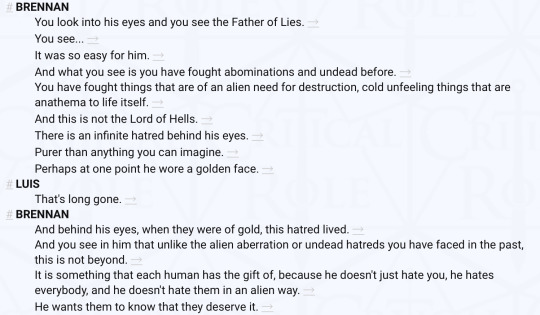
Asmodeus is the embodiment of the desire to punish, and he’s the villain because he’s wrong. That mentality is rooted in hatred. He is convinced that everyone deserves eternal torment, and he wants everyone to agree with that conclusion.
The purpose of Asmodeus is that we shouldn’t inflict punishment based on some idea that the person deserved it. Yes, revenge and victory feel good. Yes, there are often valid reasons to be angry or defensive. Yes, we can come up with a reason to justify punishment. But hurting people because they deserve it is exactly what Asmodeus does. There is always a way to rationalize that someone deserves punishment—so the right answer is that this feeling cannot be a sufficient reason to do harm. That isn’t good enough.
It’s so easy to say “they deserve it” when we know the end result is that Aeor will be destroyed and the surviving legacy is ruins full of monsters. It feels good when we think people deserve to suffer and then we get to see it happen. It feels righteous.
Vespin Chloras deserved to be remembered as a traitor because he was arrogant enough to think he could replace Asmodeus—in an age where another mage already replaced the god of death and yet another mage created a machine that killed two primordials. Zerxus Ilerez deserved to be a thrall of Asmodeus because he chose to take up the mace and contributed to the problems that got him in that dilemma—because he so fervently believed that under all that hatred was a person who needed a chance to change his mind. Sarenrae deserved to lose her followers because she decided to trust the Father of Lies—because she loved her brother and offered him mercy.
It’s so easy to conclude that someone deserves pain. Asmodeus is here to remind us specifically that it’s not the right way to handle anything.
Asmodeus is also a rather effective villain because he is supposed to be irredeemable. Archetypal villains are wonderful tools for setting audience expectations. Whether Brennan plays that straight or decides to subvert it, there isn’t as much work needed to persuade us that Asmodeus is that evil or cruel. We already believe that he’s capable of doing the worst things imaginable. Toying with those expectations is a great storytelling exercise.
Asmodeus didn’t shock us in EXU Calamity because we didn’t expect him to be evil. He was shocking because he is such a skillful liar that we wanted to believe him. It would be such a satisfying story that a well-meaning paladin was the first person to show kindness to the Father of Lies and managed to atone him. Brennan’s portrayal made us want that subversion so badly even though we knew better. Asmodeus lured us into the same trap as the characters, and then we saw the outcome: punishment—because Asmodeus will use any reason to justify it and every opportunity to inflict it.
In Downfall, Brennan could have easily rationalized that the protagonists wouldn’t agree to the truce if Asmodeus was on the infiltration team. The audience would have absolutely found that plausible. He didn’t have to be here. The decision to include Asmodeus on the side of the protagonists gives us a heads up that the story will grapple with questions about punishment.
What do I need to see before I am justified in destroying a city with no survivors? Do I have to concern myself with bystanders? Do the fearful deserve to die for choosing to oppose me? Don’t they deserve it for creating such objectionable technology and magic? Don’t I deserve the chance to live without fear of those lesser than myself? Don’t they deserve to die for corrupting those I loved? Don’t they deserve it for being loved more than me?
Why isn’t hatred a good enough reason to hurt someone?
Again, villains are tools to highlight the wrong conclusions. Asmodeus is involved to highlight that the desire for punishment isn’t a sufficient reason to destroy Aeor. The other characters, villains or not, are here to show us what other justifications there might be. Their interactions are going to brush across these themes over and over again.
I fucking love villains, and no one plays a villain quite like Brennan does.
#critical role#brennan lee mulligan#downfall#exu calamity#asmodeus lord of the nine hells#post script: also he’s just fun#just an unreprenant asshole on every level#love it
197 notes
·
View notes
Text
I'm tired of being disappointed. By far the best part of the movie was the what-could-have-been in the soundtrack. Mufasa had seeds of being good but it suffered from a lack of focus and terrible visual language, so it was ultimately unsatisfying.
I think it's actually worse when you can see the threads and interesting seeds of a good story just wasted and abandoned under a pile of Bad Storytelling.
Lack of Focus:
The movie was trying to say something about Bravery, and Bloodlines, and Vengeance, and Going Against the Status Quo, and Self-Reflection, and Loyalty, and Family, and Relying on One Another Instead of Just Yourself, and Belief in Yourself, and even Vague Spirituality, all at once. So it wound up giving the movie-equivalent of two or three disjointed sentences about each topic, and never actually made a clear point about any of them.

For example, Mufasa is afraid of water. Rafiki says that this is because Mufasa is afraid of his own reflection, even though the audience would have been assuming that it was because Mufasa almost drowned as a cub. Then in the climax, Mufasa and Kiros are battling underwater and Mufasa remembers his foster-mother telling him to close his eyes and use his other senses to hunt. So he does, and he realizes I guess through the currents, that a big rock is falling toward them, and pushes Kiros into it.
What does that tell us? That Mufasa was taught to hunt like a lioness, so he can use those skills when he needs to. Which he's already been doing with no hesitation for the whole movie. Just because he's in water during the final battle, doesn't mean that's a satisfying conclusion to what they were doing with water, as a symbol for his character.
IF Mufasa had been embarrassed about his lioness-observational-skills, thinking it made him less of a lion, or weird, and therefore rarely used those skills because he was always trying to be more like Taka or the other males—conserving energy, not being mindful of what's around him—THEN finally embraced his weird skills at the end, while in water fighting—that would be something thematic.
You would be able to say, "he's learned not to be afraid of where his skill-set is, as a leader, ergo: he's learned 'not to be afraid of his reflection/the water.'"
But that's not what happened. Because they didn't devote time to developing what, exactly, Mufasa is afraid of seeing in himself, or WHY he's afraid. Because everything he does succeeds. He wins his first race, wins his first fight, wins the favor of his adoptive father, survives diving into water even though he's afraid of it, wins at saving sarabi and then wins her affections even when he's actively trying not to—there's no reason for him to be trying not to. Not any that tie back into "Mufasa is afraid of himself." There's no reason ever shown for this weird halfhearted insecurity he sometimes has, and has to overcome.
So then it's not compelling. And that sort of thing is sprinkled all over the movie.
They keep mentioning "Milele," which means "forever" in Swahili, but that whole concept is alternately described as a "dream," or "a place you feel inside of you," but basically it's also a physical location that becomes the Pridelands. And nobody ever clarifies what exactly Milele is. It's treated like a fantasy concept or a spiritual vision or a physical utopia whenever the film needs it to be those things. But if it's never clearly defined, it's not compelling, which sucks when Milele is what the characters are "searching for." Another example of starting a concept and then never following it through to a satisfying conclusion.
They have seeds of Mufasa being the only lion to ask for help and be willing to cooperate with other animals besides lions—but they are few and far-between. He doesn't ask Rafiki for help; Rafiki sort of convinces him not to eat him. And asking animals for help like he does with the elephants or the Pridelands animals isn't unique to him; the first to do it is Sarabi, who willingly accepts and relies on Zazu despite others' scorn—and MUFASA is one of the ones who is scornful, initially! So they plant seeds for the big climax where he's the only voice that can unite animals across species by the climax, but they're don't water or tend to or help those seeds to grow. So the climax feels a little out of nowhere and less compelling.

If they had just focused on one of these things, it would've been tighter and more emotionally impactful.
Except NO, it wouldn't have been. Because you will have a hard time connecting, emotionally, to photorealistic-CGI lions even if the story's focus was tight.
Bad Animation and Filming

Lions in real life move with too much weightiness and heavy-animal-breathing for you to commit to that weight 100% of the time AND have good character acting. You can only really commit wholeheartedly to one or the other.
So you can tell in this movie the eyes are bigger and more expressive than in the first CGI Lion King. But that doesn't save it. It doesn't cut it.
When Taka is giving Sarabi his last longing look, he just looks like a vaguely displeased large animal. There's no human heartbreak in his expression.
When Mufasa is singing a fast line about not knowing how to respond to Sarabi, he should be swinging his head back and forth, like he's looking around for something in desperation—because that's what the song sounds like—and his walking, if he's walking, should be fast. A cross between running from something and searching for something. Because that's what's happening in the emotion of the song.
But lions don't move that fast, because they're heavy. And when they're looking around for something, they do it with their noses and long head-turns in sweeping motions. No fast eyes-darting-around. Certainly no human conflict of desire in their faces. So photorealistic Mufasa can't do any of those things. Which sucks, because the actions of the characters and the action in the scene should match the emotions they're feeling, and the emotion the audience is supposed to be feeling. But it can't, so everything is flat and boring.
And even if you could connect to photorealistically emotional lions—you might, we connect with our pets emotionally all the time—you wouldn't get the chance because the film avoids their faces every time something emotionally interesting is happening.
For example: my favorite part of the song "I Always Wanted a Brother" is when the beat appears to hard-drive, and it feels like a "stop everything" moment, to match Taka's outrage that someone is dissing his brother. And he goes, "what did you say 'bout my brother? That's not a stray, that's my brother! You stay away from my brother 'cuz I say so."
That whole moment, I'm envisioning Taka getting all up in another animal's face, maybe taking a swipe at it, throwing his little weight around and puffing his chest, fearsome-face. The song FEELS like that's what's happening; like he's going on and on, exploding with insistence and protectiveness.
Something similar to the "stop everything-angry" vibe of this:

But in the movie, is it a close-up shot of Taka invading another animal's space? Does the camera follow him from behind in a slow zoom, and then when he says, "what did you say bout my brother?" He spins and looks directly into the camera (in the direction of the animal he's talking to) and the camera stops while Taka charges closer? Do we get to see his angry face at all?
No.
The camera does this stupid boring thing where we, the audience, are in the branches of a tree (where the animal Taka is addressing is safely out of reach) and it pans slowly along, unfocused, like we're casually passing this interaction by. Taka's face is far away on the distant ground and you can't really see it's expression, his body language isn't doing anything interesting (he's just standing there for the whole part of the song) and at one point because of the panning, the tree the camera is in has a branch that actually hides Taka completely from view during the song.
We don't even get to see the animal he's talking to react. All we see is the back of its head.

They do this over and over in the movie. When Rafiki is finally running to meet his long lost brother, we get the back of his body, one quick snapshot of the underside of his face, and then it's flyover drone-style shots. When Sarabi and Mufasa decide to love each other, it's a close-up on the backs of their chins; no eyes, no mouths, no head-body-language. When Sarabi and Mufasa are singing a very back-and-forth interactive duet to one another, the camera is, again, far-off and distant for most of the song, rotating slowly around a landscape that they're lion-lumbering through. Boring. Distant. Wasteful.
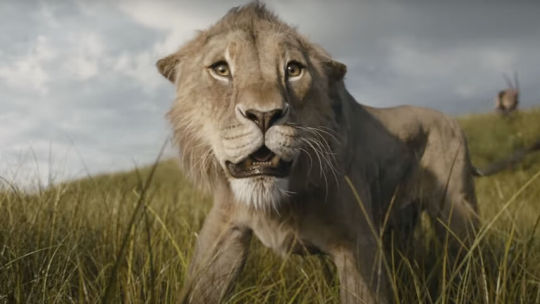
Sometimes the movie tries to match the emotional pace in the way it's shot. When Kiros is readying a killing blow and Taka has moments to decide if he's going to save his brother, that scene cuts well between the raised paw and Taka and Mufasa's faces—for example. But those are the most basic ways to shoot those scenes, and scenes like them are few and far-between.
What it needed was one overarching idea to connect the character threads, and give them time to unspool. And then it really, desperately needed to be animated traditionally so that the lions could emote like humans.
So! I'll probably be writing a series of posts exploring what could've been to correct the fumble. Because I did enjoy the concepts in Mufasa.
#Mufasa#the lion king#kiros#obasi#afia#eshe#Taka#scar#tlk#meta#character analysis#storytelling#filmmaking#film#cgi#animation#visual storytelling#lions#disney#critique#live action remake#live action lion king#review#2024 movies#Mufasa 2024#James earl jones
79 notes
·
View notes
Text
Understanding the Romantic Narrative Arcs in Final Fantasy VII
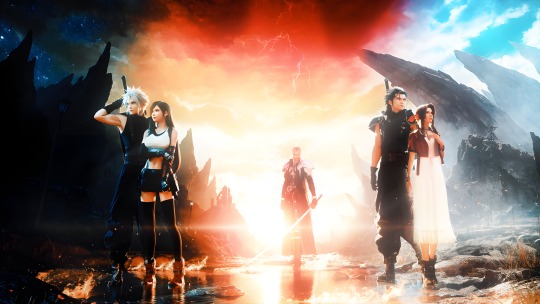
There has been no shortage of discourse surrounding the “Love Triangle Debate”, (a fan-constructed term, I must inform you) of FFVII for a very long time. Most recently, with the release of FFVII Rebirth, this discourse has intensified and led to a wide spectrum of fan conclusions that range from grounded in narrative sense to completely baseless or delusional. Some takes are attached to contemporary relationship issues, personal experience, comparisons to other media or works of fiction, social constructs or societal issues, personal preference, or a lack of full context.
While any piece of media or fiction is subject to some level of interpretation (this is the very nature of humans consuming works of art), most works are created with intentional narrative direction. In fact, many works are formulaic, especially in genres such as fantasy, romance, mystery, etc. While of course there are always exceptions and deviations, as a writer and former English literature teacher I can say that most stories follow a general narrative structure or arc that makes them digestible and satisfying to readers/audiences. Such arcs impact the main, external, internal, and subplots of a story, as well as individual character arcs and character relationship arcs.
Final Fantasy is no different. While there are other cultural influences as FFs are Japanese stories, my experience with the series is the writing generally follows most storytelling conventions that can be found in all forms of archetypal writing, cross-culturally and generationally. FFVII is often accused of being ambiguous or open-ended in many aspects of its story. I tend to disagree with this idea and think that its storytelling is subversive rather than ambiguous, meaning that it requires players to work harder and use more critical thinking in order to reach the author’s intended conclusions. It also relies on false or misleading narratives for a good part of the story (such as red herrings, illusions, or unreliable narrators) as storytelling devices that help the truth in the story unfold in later parts of the narrative arc(s). Like any piece of media using these storytelling methods, this means that there will be controversy or debate as audiences contend with the author’s messages or intentions. However, that does not mean that the intentions are not there and that there is not an intentional outcome on the part of the writers.
Personally, I believe that FFVII has a very clear narrative structure for all of its main plot, sub plots, and character arcs, but that its approach is challenging to many players who have to wrestle with the story as it unfolds to understand it. It is not spoon-fed, and some revelations may betray player attachments that were originally formed. However, in my view, this is what makes FFVII such an exceptional story when compared to many others. That being said, the lack (or refusal) of understanding of FFVII’s narrative arcs has led to discourse that unfortunately mischaracterizes many of the characters and pushes inappropriate perspectives onto the storytelling, mostly surrounding the romantic arcs of the main characters and the so-called “LTD” (the fan construction, remember?). I strongly believe that the best way to understand any story is to follow the narrative arcs in order to arrive at the author’s intended conclusions.
I’m going to attempt to do that for the romantic subplots in FFVII in hopes of bringing some clarity to this issue. This analysis is based on a standard Three-Act Romance narrative writing structure (which aligns with the Hero's Journey structure), as well common romantic archetypes and tropes, both for characters and plot, but applied to the specific context of the story, world, and characters of FFVII. Please note that this is my personal analysis and it is by no means perfect, nor am I saying this is the bible of how FFVII has been written. I just hope it gives some insight into why some storytelling interpretations of FFVII should make more sense than… others. This analysis will draw from bits of the entire compilation, but the primary focus of the structure will be looking at FF7R with the OG as a baseline.
This is a long thread, so please see the outline for discussion below.
Romantic Structure/Trope Analysis
Cloud/Tifa: The Slow Burn/Childhood Friends to Lovers Romance
Aerith/Cloud: The Unrequited Love/Not Meant to Be Romance
Zack/Aerith: The Long Lost Love Romance
Final Thoughts: The "Love Triangle" is a Narrative Illusion
Cloud/Tifa: The Slow Burn/Childhood Friends to Lovers Romance
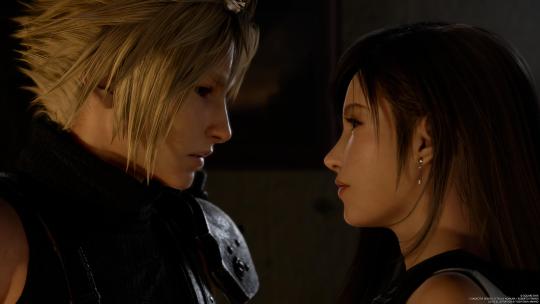
Act 1: The Beginning
The Hook (Childhood Connection Revealed)
Romance Structure: Introduction / Setup
Purpose: Establish the protagonists in their everyday lives, showing what emotional or psychological issues are holding them back from love. Readers should get a sense of their internal conflicts and motivations, along with the external situations that will challenge them later.
Childhood Friends Layer: Introduce the deep connection between the two characters, showing them as lifelong friends with an established bond. There could be hints of one or both characters secretly harboring feelings for the other, but they haven't acted on it due to fear of losing the friendship.
Example: Cloud and Tifa are childhood friends with a complicated history. Although they were close when they were little, they drifted apart but secretly longed for one another. They shared a romantic promise and then separated for seven years. At the beginning of FFVII, they are reunited, but both characters are contending with serious internal and external conflicts - Cloud’s identity crisis and the Shinra Company’s greed and abuse of the planet.
The Inciting Incident / Call to Adventure / Meet-Cute
Romance Structure: Inciting Incident / The Meet-Cute
Purpose: The main characters meet or are pushed together by external circumstances. This encounter introduces the romantic conflict—whether it’s instant attraction or tension between them.
Childhood Friends Layer: Since they’ve already known each other for years, the “meet-cute” here is more about seeing each other in a new light. Maybe one of them returns to town after time away, or an external event shifts their dynamic, making one or both start to view the other differently.
Example: Cloud and Tifa reunite in Midgar and Tifa recruits Cloud to work for AVALANCHE. She does this primarily to keep him close so she can keep an eye on him as she is worried about him and his mental state. During this time, we see an instant chemistry between Cloud and Tifa as they reconnect after years apart. When conflicts are introduced, we see the strain that it puts on them, but we also see how there’s a lingering desire for closeness, whether it be in their discussion/memory of the promise, their mutual flirting, their skinship, etc.

First Plot Point / Refusal of the Call
Romance Structure: Rejection of the Relationship
Purpose: The characters resist the idea of a romantic relationship, often due to internal or external obstacles. There’s a clear push-pull dynamic as they fight their growing attraction, often rejecting the possibility of being together.
Childhood Friends Layer: The hesitation here comes from their shared history. Both characters are afraid to risk their close friendship for something as uncertain as a romance. This dynamic creates tension as they begin to realize how much they depend on each other emotionally.
Example: This isn’t directly addressed, but the narrative deflects from intentional romantic confrontations at this point because of Cloud’s identity crisis and the pressing issues of the external conflict. Neither character is outwardly pursuing a relationship, but they don’t exactly deny their desire for closeness. We consistently see the push/pull between Cloud and Tifa throughout the early part of their arc. It's also further complicated when Sephiroth starts to sabotage their relationship.

Act 2: The Middle
First Pinch Point / Acceptance of the Quest
Romance Structure: Giving the Relationship a Chance
Purpose: External circumstances push them together, forcing them to interact and face their growing connection. Even if they resist the idea of love, the bond between them deepens as they spend more time together.
Childhood Friends Layer: Their shared history becomes an advantage and a source of conflict. The deeper they dive into new romantic feelings, the more they rely on the comfort of their friendship, but they’re also terrified of crossing the line and ruining everything.
Example: Cloud and Tifa work together both with AVALANCHE and the party at large to combat the threats present in the external conflict. Additionally, they share deep trauma from the Nibelheim Incident that brings them closer together as sources of comfort. They become one another’s rocks, and though they still do not move toward any explicit romantic confirmation, it is clear from their behavior that they both hold deep feelings for each other and care for each other greatly. Cloud in particular holds on to his promise to Tifa, making it a cornerstone of his strength moving forward.

Midpoint Crisis / Trials and Temptations
Romance Structure: Midpoint / I-Need-You-But-Can’t-Have-You
Purpose: This is a major turning point where the characters either experience a "false high" (where they feel like things are going well but something still isn’t quite right) or a "false low" (where they feel like things are falling apart). There’s often a pivotal moment of intimacy that deepens their bond but also introduces new fears.
Childhood Friends Layer: The fear of losing the friendship intensifies. They might experience their first kiss or confession of deeper feelings, but the risk of ruining their long-established bond makes the situation more fraught with anxiety.
Example: This particular point in the arc gets a little tricky for Cloud and Tifa because of Cloud’s identity crisis and Tifa’s reticence around their mismatched issues. However, Rebirth has made it clear that before the end of disc 1, Cloud and Tifa are aware of their feelings for each other and that the narrative is still in the way of it. This arc intersects events that transpire from Kalm to Gongaga, and we see the build-up of tension due to the internal conflict between Cloud and Sephiroth.

Second Pinch Point / The Road Back
Romance Structure: Pulling Back Together
Purpose: The characters are drawn back together by external events, but their internal fears and conflicts still loom large. The romance starts to deepen, but both are still fighting their feelings in some way.
Childhood Friends Layer: They try to go back to being "just friends," but it’s clear that things have changed between them. The emotional and romantic tension keeps building, and they can’t ignore how much they need each other.
Example: We see this dynamic between Cloud and Tifa continue to build throughout disc 1, particularly in Rebirth. We are consistently reminded of the tension between them and the importance of their relationship, regardless of romantic intent. Gongaga and Nibelheim are great examples of this.
Second Plot Point / The Fall
Romance Structure: The Fall
Purpose: The characters are now falling in love, even if they haven’t fully admitted it to each other. There’s often a deeper moment of intimacy—physical or emotional—that makes them realize just how much they mean to each other.
Childhood Friends Layer: One or both characters realize they’ve fallen hard for their best friend, but they are still careful or hold back from telling the other, afraid it might ruin everything. Nonetheless, they give in to their feelings in some capacity, which marks a turning point.
Example: The Gold Saucer date would be the best parallel for this point in the arc for Cloud and Tifa. In the OG Tifa almost confesses to a very interested Cloud, in Rebirth, they confirm feelings and kiss. Either way, it’s clearly meant to signal at this point, the fall has happened.

Act 3: The End
The Crisis / Dark Moment
Romance Structure: Dark Moment / The Break-Up
Purpose: This is the point where everything falls apart. The characters break up or distance themselves, either because of internal or external forces.
Childhood Friends Layer: The weight of their shared history makes this moment even more devastating. The fear of losing the friendship forever becomes real.
Example: For Cloud and Tifa, this moment is really hinged on Cloud’s mental breakdown. After the Gold Saucer Date, Cloud’s mental state progressively worsens due to events that occur within both the internal and external conflicts, and his bond with Tifa is severed completely at the Northern Crater. Cloud and Tifa are separated when Cloud falls into the Lifestream.

The Sacrifice / The Crisis Resolution
Romance Structure: The Sacrifice
Purpose: One or both characters must confront their fears and make a choice. This moment often involves a grand gesture or a realization that love is worth the risk.
Childhood Friends Layer: The realization comes that their friendship has always been the foundation of something more. They understand that risking the friendship for love is not only worth it but that the friendship can only deepen through their romantic connection.
Example: This point comes in Mideel and the Lifestream Scene. Tifa reaches her own realization about her relationship with Cloud and how her reticence has impacted things, and her conviction to save him and be with him is both profound and clearly romantic. Inside the Lifestream, Tifa helps Cloud to find himself, and many revelations about his true feelings for her are brought to light. Of course, we have not reached this point of the story in FF7R, so it will be intriguing to see how it unfolds, given all of the additional context the remake series and ToTP have provided.

The Climax / Declaration
Romance Structure: Declaration
Purpose: The characters finally confess their love for each other, making the leap from friends to lovers. This is the emotional high point where the relationship is solidified.
Childhood Friends Layer: The confession of love is tied to their long history, as they realize that their deep emotional connection as friends is the foundation for a strong romantic relationship.
Example: This moment for Cloud and Tifa is the Highwind Scene in the OG, where they confirm, without words, that their feelings match. Once again, we will see how this event unfolds in Part 3 with all the new and deepened context of Cloud and Tifa’s relationship in 7R.

The Resolution / Denouement
Romance Structure: Denouement / HEA
Purpose: The characters are together and happy, giving the reader a sense of closure.
Childhood Friends Layer: The resolution emphasizes how their strong friendship has transitioned seamlessly into a romantic relationship, giving the sense that they’ll continue to support each other as both friends and lovers.
Example: In the OG, this is seen in the FMV of the game where Cloud and Tifa are together, leading to the resolution of the entire story as Holy and the Lifestream are released. While this scene isn’t particularly direct, it’s enough to show that Cloud and Tifa are together, which leads to ACC where they live and raise a family together. This entire ending segment will likely be greatly expanded in FF7R, and so it'll be interesting to see how these moments are handled, given all of the new context.
Aerith/Cloud: Unrequited Love/Not Meant to Be Arc

Act 1: The Beginning
The Hook (Unrequited Feelings Introduced)
Romance Structure: Introduction / Setup
Purpose: Introduce the protagonist, who falls for the other character. Set up their emotional and psychological conflict, showing how these unrequited feelings shape their interactions with the other character.
Unrequited Love Layer: The character’s love is clearly unreturned, but they hold on to hope. There is a mix of admiration, longing, and pain as they watch the love interest live their life without ever seeing them as a romantic partner.
Example: Aerith’s feelings for Cloud, who she meets first on the streets of Midgar and later inside her church, are inspired by her long-lost love, Zack, whom he reminds her of. We don’t know this immediately, but we find out soon enough, and the story, especially 7R, is full of visual and symbolic cues.
The Inciting Incident / Call to Adventure / Meet-Cute
Romance Structure: Inciting Incident / The Meet-Cute
Purpose: The characters are pushed together by external circumstances, giving the protagonist more time with the love interest. The character sees this as an opportunity to grow closer, but the other character remains unaware or indifferent to their romantic feelings.
Unrequited Love Layer: The character is thrilled to spend more time with the other character and hopes this will bring them closer. However, the love interest still sees the relationship as platonic, creating tension.
Example: While their interaction on Loveless Street is the fated moment for Cloud and Aerith, the meet-cute is their meeting in the church. This is the inciting incident that not only truly triggers Aerith’s latent Zack-longing, but also begins Cloud and Aerith’s friendship as they work together for a common cause. Aerith flirts with Cloud quite a bit at this point, displaying her interest, but Cloud does not reciprocate in any romantic sense. She also refuses to let him leave and follows him around, essentially solidifying Aerith’s place in the player party and cementing her role as the heroine driving the external conflict. From here on out, we are consistently reminded that Cloud reminds Aerith of Zack, the deeper reason for her interest in him.
First Plot Point / Refusal of the Call
Romance Structure: Rejection of the Relationship
Purpose: The protagonist’s feelings remain unrequited. The other character might express interest in someone else or explicitly state that they don’t see the protagonist in a romantic light. This deepens the emotional conflict for the protagonist, who struggles with unspoken feelings.
Unrequited Love Layer: The protagonist is heartbroken but holds onto hope. They keep pushing their emotions down, unwilling to let go just yet.
Example: Aerith meets Tifa and quickly realizes that she is someone deeply important to Cloud. In Remake, she realizes this even before meeting her when Cloud has a headache and calls out Tifa’s name. Her awareness changes her behavior somewhat, but internally, she still is still conflicted because of her internal conflict over Zack.
Act 2: The Middle
First Pinch Point / Acceptance of the Quest
Romance Structure: Giving the Relationship a Chance
Purpose: External circumstances continue to push the characters together, and the protagonist’s feelings deepen. They begin to cling to small moments, hoping that their love might one day be reciprocated.
Unrequited Love Layer: The protagonist interprets friendly gestures as signs of romantic potential. They invest emotionally in every small interaction, hoping it means more than it does. However, deep down, they start to feel the weight of their unreturned affection.
Example: The journey continues with the party leaving Midgar, and Aerith’s feelings for Cloud grow despite her knowledge of his bond with Tifa as the party travels together. In Rebirth this is further complicated by Aerith’s loss of foresight/memories to the Whispers. We are also constantly reminded of Aerith’s lingering feelings for Zack and her grief and sadness over his loss/disappearance. Throughout the journey, she seeks out opportunities to spend time with Cloud - “dates” even though these moments are not reciprocated romantically. A notable example of this is her date with him on the clock tower in Kalm, where she speaks to him about his relationship with Tifa (hinting at her knowledge of their bond and her jealousy over it) and then her public declaration that they were on a date (in front of Tifa). Cloud's reaction to moments like these continue to inform the audience he does not return romantic affections for Aerith.
Midpoint Crisis / Trials and Temptations
Romance Structure: Midpoint / I-Need-You-But-Can’t-Have-You
Purpose: A major turning point occurs where the protagonist either faces the possibility that their love will never be returned or sees a fleeting moment where they think it might be. The emotional stakes are higher, as the protagonist grapples with whether to continue holding on.
Unrequited Love Layer: The character might attempt to make their feelings known, either explicitly or through subtle gestures, but the love interest doesn’t reciprocate. The character is left feeling exposed and vulnerable, yet still holding on to hope that things might change.
Example: For Cloud and Aerith, this continues to be the nature of their relational development throughout most of disc 1, but their interaction on the water tower in Nibelheim is probably the best example of this. Aerith has to grapple with her jealousy over Cloud and Tifa’s bond, which she has been observing for the entire game. Her acknowledgment of her feelings over it is a major turning point as a character. Additionally, this moment really cements that Cloud views his relationship with Aerith as a cherished friendship, as we see the way that he cares about her angry reaction.

Second Pinch Point / The Road Back
Romance Structure: Pulling Back Together
Purpose: Circumstances force the characters to spend more time together, even though the character is starting to feel the emotional strain of unrequited love. There may be a moment of temporary hope, but it’s tinged with the growing realization that their feelings might never be returned.
Unrequited Love Layer: The character becomes more emotionally drained as they begin to sense that their love will remain one-sided. They might try one last time to be closer to the love interest, but the gap between them is becoming clearer.
Example: This moment could best be viewed through Cloud and Aerith’s Gold Saucer date. There, Aerith not only tries to get closer to Cloud but she opens up emotionally and gives Cloud insight into the root of her feelings, which is Zack. Cloud does not reciprocate any of Aerith’s romantic overtures in this date and rather displays discomfort or awkwardness throughout most of it. However, he does allow her a moment of emotional vulnerability, which he has not been willing to do previously. This is further contextualized by how, In Rebirth, Cloud has remembered Zack by this point (albeit incorrectly). Cloud, who cherishes and cares for Aerith greatly as a friend, is considerate of this connection and offers her comfort for the grief and loss she has just admitted to feeling and seeking consolation in him from. Hence "just until the ride's over"; "I didn't do anything" etc...

Second Plot Point / The Fall
Romance Structure: The Fall
Purpose: The character finally realizes that their love will never be returned. This is an emotionally intense moment where they are forced to confront the truth—they will never be more than a friend or confidant to the love interest.
Unrequited Love Layer: The protagonist may be devastated by the final confirmation that their feelings will never be returned. The emotional weight of unrequited love becomes too much, and they start to realize they need to let go, or come to other realizations about their feelings.
Example: The moment that most closely matches with this point in the arc is the dream stroll through Sector 5. Not only does Aerith accept that Cloud doesn’t return her feelings romantically, but she comes to a realization of her own feelings and questions them. This is clearly a reference to Zack, whose internal conflict has been consistently foreshadowed. Aerith also seems to recognize that she can’t help Cloud with his internal conflict - that is Tifa's role.

Act 3: The End
The Crisis / Dark Moment
Romance Structure: Dark Moment / The Break-Up
Purpose: This is the point of emotional reckoning, where they face the reality of unrequited love and move on in their arc.
Unrequited Love Layer: The character experiences grief over their unreturned feelings. They might decide to pull away from the love interest entirely, or they may try to come to terms with remaining friends while letting go of their romantic hopes and moving on.
Example: For Aerith, this moment is marked by her complete transition to her role in the external conflict. At this point, she has let go of her romantic fancy for Cloud and has committed herself to the bigger picture. It is at this point that she leaves the party, and leaves Cloud in the Sleeping Forest, to fulfill her role as a Cetra.

The Sacrifice / The Crisis Resolution
Romance Structure: The Sacrifice
Purpose: The protagonist sacrifices their unrequited love, realizing they need to move on for the sake of their own emotional well-being or greater purposes. This is a bittersweet moment of acceptance and self-growth, where they let go of the hope that kept them holding on for so long.
Unrequited Love Layer: The protagonist may realize that holding on to unrequited love is only hurting them or preventing them from reaching a greater purpose.
Example: For Aerith, this point in the arc is less about Cloud and more about her role in the external conflict. This is the point in which she travels to the Forgotten City, prays, and ultimately is killed. However, it is bittersweet and tragic for her, ultimately, because she dies with unrequited love from Cloud and without ever getting closure on her true love, Zack.

The Climax / Declaration
Romance Structure: Declaration
Purpose: Instead of a declaration of mutual love, this is the protagonist’s internal declaration of acceptance. They start the process of moving on.
Unrequited Love Layer: The protagonist lets go of the love interest in their heart, realizing that they need to focus on their own future. The love interest is likely unaware of this internal shift, but it’s a powerful moment of growth for the protagonist.
Example: For Aerith, this is perhaps best viewed in her complete transition after death to the larger role she plays as the heroine of the planet from within the Lifestream. Her arc has fully transitioned away from her feelings for Cloud into her greater purpose. In FF7R, we can hope to see how Zack, who has been trying to find her, begins to impact this next phase of her arc.
The Resolution / Denouement
Romance Structure: Denouement / HEA
Purpose: Instead of a traditional happy ending, this is a reflective, bittersweet resolution. The character has grown emotionally. There is a sense of closure, though it may come with lingering heartache.
Unrequited Love Layer: The character has let go of the hope that their love would ever be returned. They are stronger for it and have moved on.
Example: For Aerith and Cloud, this moment is best summed up by their brief Lifestream reunion at the end of the game. It will be intriguing to see how this moment is expanded and provides closure for Cloud and Aerith’s relationship, as well as Zack’s role in both.

Zack/Aerith: Long Lost Love/Tragic Love Arc

This arc is a little more complicated to map out since it is not only incomplete but riddled with mysteries at this point. However, I’m going to do my best to make the connections based on the information we have and where we can theorize things may be going.
Act 1: The Beginning
The Hook
Romance Structure: Introduction / Setup
Purpose: Establish the protagonist’s life after the estrangement, showing how unresolved feelings for their lost lover impact their emotional world. There’s a sense of longing and unfinished business that propels the protagonist’s actions.
Long Lost Lovers Layer: The protagonist is haunted by memories of their estranged lover and driven by a deep desire to find them again. This longing is fueled by unresolved emotional wounds, and the protagonist clings to the hope of a reunion.
Example: In Rebirth, from the beginning, Zack is singularly focused on reuniting with Aerith. After his escape from Nibelheim, even as he carries the wounded Cloud, Zack’s thoughts are consumed by Aerith. His love for her pushes him forward despite the dangerous and confusing circumstances he finds himself in. Zack’s motivation intensifies when he discovers, through a newscast, that Aerith is in danger. This revelation shifts Zack from hopeful longing to immediate action, driving home the urgency of his quest. His decision to prioritize Aerith’s safety over everything else, including Cloud, underscores how central Aerith is to his purpose, raising the stakes for his emotional journey.
The Inciting Incident
Romance Structure: The Call to Adventure
Purpose: The inciting incident transitions the protagonist from passive longing to active pursuit of reunion. Some event or revelation forces the protagonist to act, prompting them to seek out their estranged lover. Often, this is triggered by the discovery that the lover may be in danger.
Long Lost Lovers Layer: The protagonist realizes that simply hoping for a reunion isn’t enough—there’s now a tangible reason for urgency. This event serves as a catalyst for the protagonist to fully commit to the journey of reconnecting with their lover, increasing the stakes as they shift from passive longing to active pursuit.
Example: After mysteriously "surviving" his last stand against Shinra (as seen at the end of Crisis Core), Zack rescues Aerith from Shinra’s grasp in Rebirth. However, instead of a triumphant reunion, the moment is clouded with confusion and tragedy. This rescue scene signals Zack’s deep emotions for Aerith and heightens the sense of foreboding in their relationship arc. The player quickly realizes that the reunion isn’t straightforward and that darker forces are at play, casting a shadow over Zack’s determined rescue.
First Plot Point
Romance Structure: Refusal of the Call / First Obstacle
Purpose: The first major obstacle or refusal of the call introduces the initial challenges the protagonist faces in their pursuit of the lost lover. Despite their determination, external forces or internal doubts surface, complicating the journey.
Long Lost Lovers Layer: The protagonist’s optimism about reuniting with their estranged lover is challenged by harsh realities—whether through physical danger, supernatural elements, or emotional barriers. This moment introduces doubts about whether a reunion is possible, raising tension and uncertainty.
Example: Zack eventually brings a comatose Aerith and Cloud to Elmyra’s house. Zack’s devotion to them is evident as he cares for them despite their unresponsive states, but the world around him behaves in strange ways. The eerie sense of something deeply wrong in Sector 5 hints that Zack’s reality—and Aerith’s fate—are far from certain. He’s not just fighting to reunite with Aerith; he’s battling a reality that is becoming increasingly unstable. The player shares in Zack’s growing sense of anxiety and confusion, setting the tone for the more tragic layers of their arc to come.
First Pinch Point / Acceptance of the Quest
Romance Structure: Giving the Relationship a Chance
Purpose: The protagonist resolves to pursue their lost lover, hoping to rekindle what they once had. However, unresolved issues and emotional scars from the past begin to surface, complicating their journey.
Long Lost Lovers Layer: Time and distance have changed both characters, making reconnection difficult. The focus is on how time has altered both individuals and the lingering emotional weight of their separation.
Example: Zack’s attempt to reunite with Aerith is complicated by the metaphysical separation created by the Lifestream. Aerith remains comatose, as does Cloud, and Zack has to contend with both his own internal conflict as he tries to help them as well as the external conflict of his strange and mysterious circumstances within "Sector 5".

Midpoint Crisis / Trials and Temptations
Romance Structure: Midpoint / I-Need-You-But-Can’t-Have-You
Purpose: The protagonist’s need for their lost lover intensifies, but the relationship is far more complicated than expected. Old wounds and emotional or external barriers resurface, making reunion seem out of reach. Despite their determination, the protagonist begins to doubt whether they can ever restore what they once had.
Long Lost Lovers Layer: Time and emotional distance have changed the dynamics of their relationship. While both may care for each other, the past cannot easily be erased, and their attempts to reconnect are fraught with tension.
Example: External forces such as Sephiroth’s manipulations, and Aerith’s internal conflict over Cloud create an emotional barrier between her and Zack. Aerith, “asleep” in Zack’s world, remains unaware of his presence. As Zack learns from Marlene that Aerith’ "likes" Cloud, more tension and conflict is added. Despite these challenges, Zack remains unwavering in his commitment to reconnect with Aerith, determined to overcome the growing emotional distance.

Second Pinch Point / The Road Back
Romance Structure: Pulling Back Together
Purpose: The protagonist makes another push to reconnect with their lost lover despite significant setbacks. Faced with the reality that time is running out, the protagonist must act decisively to restore the relationship. While emotional connections may deepen, unresolved challenges threaten the outcome, leaving uncertainty in the air.
Long Lost Lovers Layer: Despite growing obstacles, the protagonist remains committed to rekindling the relationship. The emotional and physical distance between the lovers may still seem insurmountable, but the protagonist refuses to give up, holding onto the hope that they can salvage what they once had.
Example: Even as Zack’s hope begins to wane, he remains steadfast in his desire to reunite with Aerith. Zack finds himself pulled in multiple directions, creating additional conflicts. External forces and emotional entanglements continue to complicate their relationship, but Zack’s determination to bridge the emotional gap keeps pushing him forward. This section of Rebirth continues to heavily foreshadow both the truth about Zack as well as the future of Zack and Aerith's relationship, despite the conflicts.

Act 3: The End
The Crisis / Dark Moment
Romance Structure: The Break-Up / Darkest Hour
Purpose: The protagonist faces their darkest moment, where it seems that the reunion will never happen. Emotional scars or external forces tear the lovers apart, and the protagonist believes they’ve lost their final chance to reconnect. The relationship nears failure as the protagonist faces the harsh reality of their situation.
Long Lost Lovers Layer: The conflict grows to the point of no return. Previous mistakes or external conflicts surface, causing the relationship to fall apart, and the protagonist is left devastated, feeling that the reunion may never come.
Example: In Rebirth, this moment comes near the ending of the game when Sephiroth's confluence of worlds plays a role in role in further uprooting Zack's existence in the Lifestream. We also know that this is the time that Aerith dies in the real world, further complicating matters and adding new layers of conflict.

The Sacrifice / The Crisis Resolution
Romance Structure: The Sacrifice
Purpose: The protagonist realizes that to win back their lost lover, they must sacrifice their pride, fear, or ego. This emotional climax reflects their willingness to make a grand gesture or display vulnerability, showing they’ll do whatever it takes for a second chance.
Long Lost Lovers Layer: The protagonist makes a final, heartfelt plea to the estranged lover, acknowledging their mistakes and baring their soul. The lover, moved by the sincerity, must decide whether or not to take the risk of rekindling the relationship.
Example: Although we don’t yet know how this will play out in the Remake series, it’s likely that Part 3 will feature a reunion between Zack and Aerith. The conflicts that have built up—including Aerith’s internal struggle regarding Cloud—will need resolution. Advent Children (ACC) shows Zack and Aerith together in the Lifestream, setting the stage for a reunion in the Remake. The exact nature of this reunion remains speculative, but it’s likely Zack will make a significant sacrifice or grand gesture to resolve the emotional conflicts that have kept them apart.
The Climax / Declaration
Romance Structure: Declaration
Purpose: The estranged lover finally decides to take the risk and give the relationship another chance. After much internal struggle, they admit they’ve never stopped loving the protagonist, and they’re ready to move forward together. This is the emotional peak where both characters commit to each other.
Long Lost Lovers Layer: The reconciliation finally happens. After everything they’ve endured, the estranged lover acknowledges their lingering feelings and agrees to rebuild the relationship. Both characters take a leap of faith, trusting that they can overcome the past and move forward.
Example: Though speculative, if the arc follows the long lost lovers trope, Zack and Aerith will likely experience a heartfelt reunion in Part 3. Their lingering feelings would finally be acknowledged, clearing up Aerith’s complicated feelings for Cloud while reaffirming her bond with Zack. This declaration of love would also tie into the larger narrative arc, offering emotional resolution for both characters and allowing their story to move forward, especially in support of Aerith's role in the external conflict of the Planet.

The Resolution / Denouement
Romance Structure: Denouement / HEA
Purpose: The story concludes with a glimpse of the couple in their newly rekindled relationship. The emotional weight of their past has been lifted, and they are now ready to face the future together. Even if circumstances prevent a traditional “happy ending,” there is emotional closure and a sense of peace.
Long Lost Lovers Layer: After the pain, separation, and emotional struggle, the couple is finally together. The audience is left with a sense that their love will endure this time, offering a bittersweet but satisfying conclusion to their long journey.
Example: In Advent Children (ACC), we see Zack and Aerith reunited in the Lifestream, helping Cloud in his final battle. Their reunion suggests that, while they may no longer live in the physical world, their connection endures beyond death. Though bittersweet, their reunion offers emotional closure. The final installment of the Remake series will likely bring full resolution to Zack and Aerith’s arc, providing a satisfying conclusion, even if there are tragic elements along the way.

Final Thoughts: The Love Triangle is a Narrative Illusion
Cloud and Tifa’s Slow-Burn Childhood Friends to Lovers (Canon)
Cloud and Tifa’s relationship in Final Fantasy VII is a carefully crafted slow burn, rooted in a deep bond that extends back to their childhood in Nibelheim. Their connection is not built on superficial or flimsy romantic interactions but on a shared past and the quiet intimacy that grows from years of unspoken longing but is complicated by trauma.
Cloud and Tifa’s natural chemistry is driven by their subconscious desires and the deep, unspoken feelings they have for one another. For Cloud, his buried emotions instinctively reach out to Tifa, even though he isn’t fully aware of them. The narrative hides these true feelings, but subtle moments of affection and protectiveness reveal that, deep down, Cloud’s heart is already tied to hers, laying the groundwork for their eventual emotional connection.
The game’s emotional climax in the Lifestream, where Tifa helps Cloud piece together his shattered memories, is a pivotal moment in which both characters finally confront the depth of their feelings for each other. Their journey isn’t one of dramatic declarations, but rather a gradual, emotional reconnection that allows deeply held, mutual love and longing to blossom—a love that is grounded in shared history, healing, and mutual understanding and compassion.
This slow-burn romance stands as the true heart of Cloud’s emotional journey, dispelling the illusion of a love triangle and making it clear that Cloud’s deepest emotional ties are with Tifa.

Aerith and Cloud’s Unrequited Love / Not Meant to Be Semi-Canon/One-sided) (Fanon - mutual)
The dynamic between Aerith and Cloud, while often misinterpreted as romantic, is better understood through the lens of unrequited love and fate’s intervention. Aerith’s initial attraction to Cloud is undeniably influenced by his resemblance to her first love, Zack Fair.
As time goes on, Aerith tries to see Cloud for who he is, but tragically, this is not possible before her death, and her feelings remain complicated and unreciprocated. Their bond, while significant as friendship, never goes beyond that, reinforcing the fact that Aerith’s feelings for Cloud are more of an echo of her past with Zack.
Cloud's true self being in love with Tifa and Aerith’s tragic death seal the fate of their relationship as one that was never meant to be—a fleeting connection, shaped by circumstance rather than true compatibility.
The tragedy of this unfulfilled arc serves as a powerful narrative device, but it is clear that Cloud and Aerith were never destined to end up together, further dispelling the notion of a love triangle.
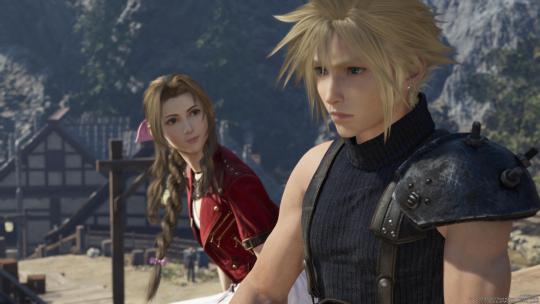
Zack and Aerith’s Long Lost Love / Tragic Love (Canon)
Zack and Aerith’s relationship is the quintessential tragic love story in Final Fantasy VII, defined by separation, longing, and loss. Aerith’s first love, Zack, vanishes from her life without explanation, leaving her with unanswered questions and unresolved feelings. Even as she begins to move forward, her heart never fully lets go of Zack, who is revealed to have fought valiantly to return to her—only to tragically lose his life in the process.
The tragedy of their love lies in the fact that both characters hold onto each other, but fate conspires to keep them apart, making their love story one of the most emotionally poignant elements in the game. Even in death, their connection endures, with Zack and Aerith appearing together in the Lifestream in ACC, symbolizing a love that transcends life itself. This arc, while bittersweet, resolves the narrative of Aerith’s romantic life—Zack was her true love, and Cloud was a reflection of the man she had lost, not a new love interest.
Their tragic love story dispels the myth of a love triangle in Final Fantasy VII, emphasizing that Aerith’s heart always belonged to Zack, even as she developed a bond with Cloud during her journey.
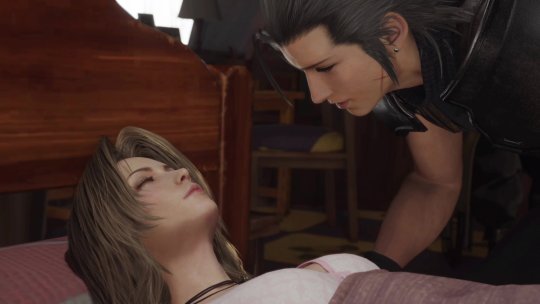
All of the relationships in the game are important. However, Cloud/Tifa & Zack/Aerith are the canon, mutual romantic relationships of Final Fantasy VII. Cloud/Aerith have a cherished friendship, but any romantic subtext of their relationship in the game is used as a vehicle to drive the conflicts and truths of the canon relationships forward. This is accomplished through illusions and subversions in storytelling, as well as creating internal conflict for the characters and canon relationships.
FFVII’s storytelling is deliberately designed to mislead the player through incomplete truths and emotional misdirection, including the use of red herrings, illusions, unreliable narration, and the omission of critical information or context. Cloud’s confused memories and persona, coupled with Aerith’s initial attraction to him based on his similarities to Zack, create the illusion of a romantic triangle, but the deeper truths—Cloud’s unresolved trauma and false identity, Tifa’s role as the keeper of Cloud’s real past and his true feelings, and Aerith’s ultimate fate as the Planet’s protector and her true love being Zack—gradually dismantle this illusionary love triangle.
I cannot stress enough that FFVII is not a love drama or soap opera where the game’s conflict centers on romantic rivalries, betrayal, deception, or morally questionable behaviors.. It’s a complex story that focuses on themes of life, loss, identity, self-discovery, legacy, and on and on.
Love - all kinds of love, including romantic, platonic, and familial - is a theme of FFVII, but truly and holistically, not for the sake of creating meaningless drama between the characters. The relationship dynamics appear messy at times in the earlier parts of the story, but these dynamics are designed to help us reach the proper conclusions about the story and the characters’ arcs, and how true love is a vehicle for reaching resolution for both.
Player’s choice is irrelevant to the plot. You cannot decide or alter the story structure or direction or individual character arcs or relationships. The most you can do is view the game through a slightly different lens by gaining an expanded understanding of character arcs and motivation with new replays.
Shipping is a fandom construct. It’s meant to be fun, and you can ship whatever you like. But shipping doesn’t intersect with the facts of a story or its narrative. Lying about any piece of media to convince yourself or others of its canonicity is bizarre behavior.
Respect the work and its intention, while having your shipping fun within your fandom. Don't embarrass yourself by saying an FF protagonist kissing the girl he’s loved since childhood and joined the army to impress means nothing, or worse, proves he the opposite of a hero.
You can ship your fanon without doing all that.
Last thing: Reunion is a primary theme of Final Fantasy VII. You may have noticed that it is also a primary theme for both of the canon romantic relationships. Personally, I believe that Part Three is going to drive this message home in a way that is unmistakable. I also believe that both lovers' reunions will be instrumental in resolving all of the conflicts of FFVII in the final game.
It’s not a coincidence that both reunions will take place in the Lifestream, or that they've been foreshadowed by the presence of the yellow flower.


I also believe that the dual Rebirth cover arts, described by Tetsuya Nomura as Sephiroth "tearing Cloud and Zack's worlds apart" are heavily foreshadowing the resolution of these relationships along with their connection to the the larger story structures of FFVII/FFVIIR.
Let's wait and see when Part 3 comes along.

#ffvii#cloud strife#cloti#tifa lockhart#final fantasy vii#ffviir#ffvii remake#ffvii rebirth#ltd#love triangle#love triangle debate#shipping discourse#shipping dynamics#shipping drama#shipping discussion#shipping debates
82 notes
·
View notes
Note
Do you have any tips/advice for someone doing comics? Like, shorter ones, not necessarily longer form stuff? How to plan a lil scene, set up panels, etc? Anyway, I like your comics a lot, your art is really cool and I hope you have a nice day <3
i feel like i do what you arent supposed to do, but i write a lot of my short comics from the seat of my pants. i have a general idea of what i what to accomplish, sometimes i have some dialogue and stage direction written in my notes app, and i just. draw a rectangle and start going. that tends to be why a lot of my mspaint comics tend to be talking head type deals, haha. ill try to give some proper advice, but im also just a hobbist whos taken a some classes about communication through design and comics years ago.
most comics do well if you establish a scene with a larger set piece, then you can narrow down to characters or actions. show us where we are in space, and the audience can take that knowledge and move along the other panels with a stronger suspension of disbelief. (bc comics are all about giving toys to your reader and hoping they play with you) heres the first page of my anya n swansea comic illustrating this. big location panel, then narrowing down to character moments.

you notice as i focus more on dialogue, that my scenery gets left out. this is bc theres only so much space in a panel, so i need to choose what gets shown. of course this depends on what medium you work with, but the gist is the same amongst all types. dont give your reader TOO much to play with or they might get confused, or will start skimming. not what we want!
for shorter comics, id suggest something eye catching right at the beginning to catch readers attention. if you have multiple "pages" or breaks in the comic, make sure the last panel before the next page is enticing. be it a punchline or cliff hanger, something to keep the reader interested. jingle those keys. in general most short comics need to end on a punchline or satisfaction or deep thought. something for the reader to chew on after their done reading, or to inspire rereading. makes for a satisfying read!
but it also depends on how you want to structure a comic page. this comic of anya and curly i did is very different than the previous one i showed, and i think its one of my fav recent comics. it starts with a weird piece of dialogue that makes you ask "what does that mean" which gets answered by the next panels. theres visual and spoken repetition, theres very little said, and its short and sweet. very easy to read and reread, so its easy to take in, and its easy for the reader to sit with it longer and ponder it more. and be able to draw their own conclusions. play touys with meeee
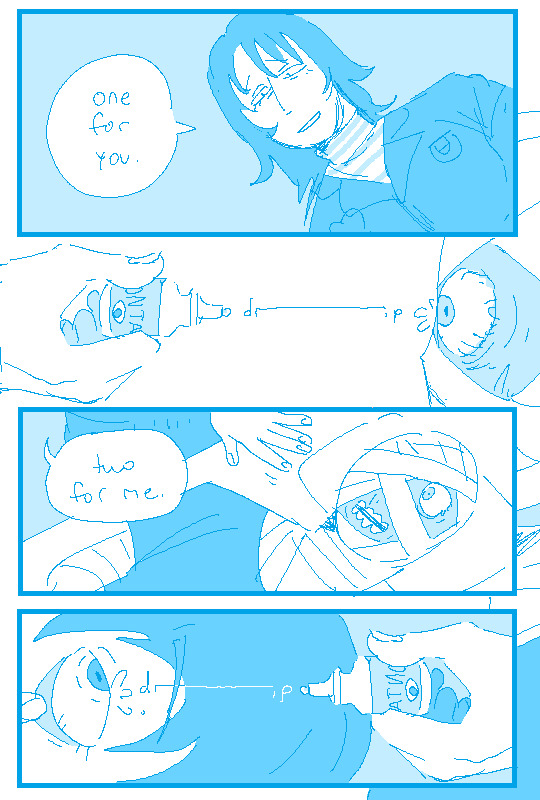
i think when it comes to planning scenes, it depends on what you want the reader to get out of it. when i was planning this comic page, i really wanted to mention that curlys tear ducts probably dont work, and anyas been wearing the same contact lenses for months! i wanted to showcase their similarities and how they mirror each other narratively and i had the idea to use the onomatopoeia of drip to stand in for the drip of saline. but i didnt have any solid ideas past that. but i do like showcasing mundane sort of events, so i thought maybe just a simple exchange of using saline to wet curlys eye, and then her eyes. initially the idea to literally copy and paste the action of applying the saline was out of ease so i didnt have to draw it again, but i found that it worked for the narrative, so i leaned into that. i flipped anya around to better convey them as on either side of the mirror, and had anya repeat her dialogue.
something else to debate about in layout, is making sure the comic isnt too unbalanced (unless thats a theme/motif youre wanting to work with) in this comic page, anya always remains on the left side, except the first panel where she is on the right. i Could have swapped her and her dialogue in the first panel, so she stays on the left and better mirrors curly in panel 3, but if i did that, the comic would be very left heavy. anyas hair and her clothes are a heavy, dark color, it takes up a lot of visual attention. i thought the comic would look more pleasant for anya to be on the right in the first panel to balance it out, as i didnt find much narrative use for her to be on the left side always. the reader would still read the comic left to right and follow the typical reading pattern regardless. to make up for this, in panel 3, curly mirrors the angle she's at in panel 1, its not an exact mirror, but its enough that i was satisfied with it.
in other comics, it might be easier to play with how the eye would move across the page. regardless, its something important to keep in mind. you have to assume how the reader will read your comic, and if youre going to be breaking the rules, you need to put in lots of safeguards to make sure the reader can understand what youre doing. too much dialogue in confusing places? work with the speech bubbles to create hierarchy and flow so the reader knows how to read everything in order. number one rule of design we were taught was people are stupid, so you have to play at their level, or baby proof your level DX designers and artists know all the rules, but readers dont have a grasp on the rules themselves, just the vibes of the rules.
the most important thing with comics is legibility. if the reader cant understand or follow the comic, it might as well be like them not reading it at all. and the worst thing that could happen is they think what youre doing is pointless. so you have to juggle what you want to accomplish, what the reader can understand, what the medium limits you to, and what rules you think you can get away with breaking.
hope this is some sort of satisfying answer! i feel like im always hit or miss with advice XD;;
52 notes
·
View notes
Text
Now that I've seen all three versions of the finale, I can give my thoughts. It's not the worst final episode I've seen, but I am disappointed. I enjoyed the meta-ness but wish it was executed better.
Wwdits likes to play loose with continuity, especially dropping plotlines at the start of a new season, but they usually give us conclusions to arcs within a season like Season 5's throughline of Guillermo struggling with vampirism. Not this time. Season 6 just felt superfluous. Nandor/Guide, Jerry's return, the Monster's search for love - none of it went anywhere and could have been cut without much of a difference. Even one off episode things like Laszlo's growing awareness of Sean's mortality or Guillermo's cousin finding out about vampires came up and then were never followed up on. It makes me wonder why any of these plotlines were introduced in the first place? I'll give them credit for giving Guillermo's work plotline and Nadja's attempts to understand humans proper conclusions. Guillermo's experience teaches him that he doesn't belong in the human world and that humans can be just as predatory as vampires, and Nadja's job helps her become the most emotionally savvy member of the house, but that's it.
I get that "nothing ever changes with the vampires" and "nothing the vampire's do matters" are big themes in the finale, and they've popped up in previous seasons, but being thematically consistent doesn't make an ending satisfying if it doesn't have emotional catharsis for the audience. Why should we care if the characters don't? What's the point of the plotlines if everything keeps looping back around to where we started? Without a payoff, it can come across as time wasted.
That's a pity because wwdits had so much going for it - interesting characters and relationship dynamics and fun bits. It just seems like the writers didn't know how to go beyond the individual scenes to find a satisfying conclusion, so they didn't bother to try. They contructed the finale in an interesting way by having 3 versions of the same episode air, but the content still felt empty. The episode itself even seemed aware of this, reminding us that last year's conclusion would have made a better series finale and having Colin comment on how many series mess up their ends. I appreciate the writer's self-awareness, but it didn't make the episode any more enjoyable.
That said, I'm glad they did not stick with the "Guillermo leaves again" fake out ending because that would be the cherry on top of my "nothing ever changes or matters" problem with the show. I also liked some of the "perfect ending" hypnosis scenes. I'd rank them as 1 Rosemary's Baby, 2 Newhart and 3 Usual Suspects.
Overall, this is a flawed show that was still fun even if didn't quite stick it's landing.
71 notes
·
View notes
Text
Finally.
As we hit the halfway point of AYS, I've been wondering about the overall story arc. What part of the story is the one that floats over the entire narrative? To me, it is also the story that is the most sensory one, the one thing about AYS that touches me and sets my mind off of these tangents.
I'll give you a clue:
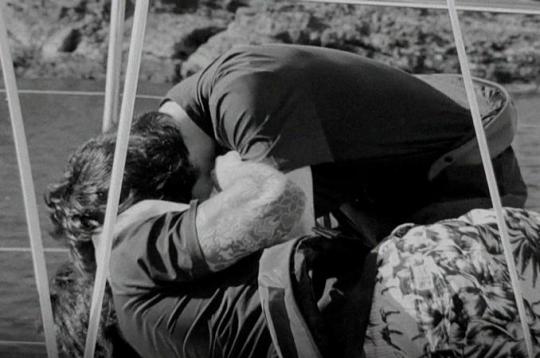
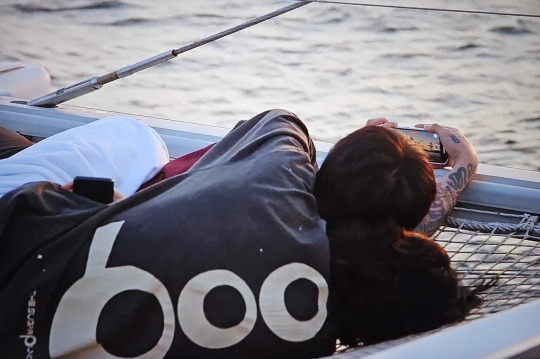
It's them. Their interactions.
The way jikook as a pair kicked off this journey was a contentious one. We all remember the first episode and the talk they had. There are many reasons, from the editing to the self censoring jikook do in front of the camera that have led to #TheCarScene making the audience feel either uncomfortable or made them sit at the edge of their seat. Hanging off of every word (and translation). There is both a lot happening and not enough. But not many can say that scene left them unmoved. I like that! That means that the audience is engaged! It pulls us in. Especially those of us who love to observe human communication. Yet, now we long to move on from the discomfort that interaction sparked. We long for catharsis. To feel that the conversation they had isn't just hanging there balancing them on a precipice, but that it will be OK for them in the end.
Jungkook’s "Finally" went a long way to guide us to such a resolution, but to me, his relieved exclaim is just the beginning. This, to me, is what the entire show portends to be about.
How does that 'Finally' look like throughout the 8 episodes? How will we look back on that 'Finally' once we've seen them all?
Like I said, we're at the halfway point (already 😭), episode 4, and where is that on-screen relationship building towards? What kind of 'beats' does the story NEED to hit in order to come to a satisfying conclusion within the shows narrative? How does the show earn that 'Finally'?
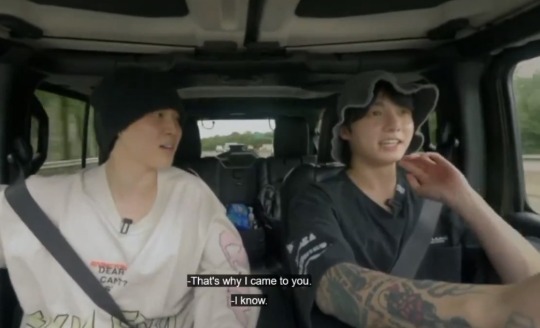
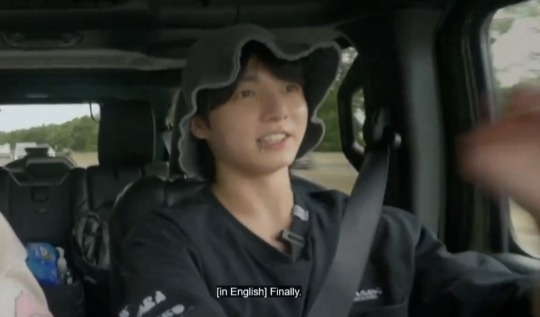
Sure, Are You Sure is a 'travel-vlog-mukbang-buddy-cop-show', but it's also the story of two seemingly estranged best friends/lovers who've been incredibly busy and who've taken it upon themselves to carve out time to be at ease together. If we look at their busy schedules as being in the way of them being THEM, then the most important goal of AYS is to get them back to that state.
Are You Sure is jikook's safe heaven.
If we were to look at all episodes as a way to work towards that hypothetical goal (Jikook back on the same wavelength) then the story beats per episode look a little like this.
Ep. 1: Two friends embark on road-trip, they've missed eo and want to do fun things together. Lot's of eating.
Ep. 2: Even short term illness can't keep them from sightseeing and eating, more warming up together: spanking in bed edition
Ep. 3: Surprise guest! Cut the camera's: the duo take a pause on domesticity and play games as a trio.
Ep. 4: The duo is the core of the story, pick up where they left off: re-kindling. They make beautiful moments together.
Ep. 5: I expect another conversation about their desire to spend meaningful time together 'Deep talk phase 01'. New location?
Ep. 6: New location but treasured memories pop-up from their first Tokyo trip. What does the future for this duo look like (the military service talk?) aka 'Deep talk phase 02'.
Ep. 7: Level-up: fun snow time activities?!
Ep. 8: More deep talk, 'Phase 03' that cements this duo as utterly and completely besotted with eo. They either talk about their joint enlistment or about traveling after MS...maybe both.
How do you think the next episodes will play out if we think of each episode as building towards a satisfying conclusion?
106 notes
·
View notes
Text
Timmy Turners fate in the new series is one of the most anticipated/theorized aspects of the new show right now. We have multiple easter eggs towards him being a possible character in the new show, and due to the creator saying that Timmys kids could possibly be Cosmo and Wandas next godkids, I don't think Timmy has kids yet (aka the channel chaser ending might be on its way, but not happened just yet.) He is arguably going to either be a huge hit or miss, everyone has different ideas, fates, what he should be, what would be the best conclusion to his character. The lines between real genuine trauma and gags in the old show are blurry, as well as core aspects of his personality. It’s so hard to actually write him as an adult for the new show purely cause what exactly are you going to take from the show that MATTERS. Will you take the lovingness of his parents from season one? or the neglectful spiteful parents they become from season 4. Will you take the horrible grades as him actuallly being bad at school, or crocker failing him on purpose. Will chole even be his best friend? Or is it back to AJ and Chester? Or will his only friends be cosmo and wanda?
We’re Cosmo and Wanda parents to Timmy, or just godparents.
Its already proven that timmys magic somewhat stayed (aka Peris existence, Dale being a millionare, hell even dimsdale/fairy world being intact) If they will acklowdge that? The school mascot being Timmy turner adjacent, past fairy’s seeming to have remembered Timmy (The tooth fairy having a little card of Timmy, Jorgen hanging out w cosmo and Wanda more CAUSE of Timmy’s adventures etc). He’s somehow a crutal part of almost every piece of the show and he’s not even there. I fully believe they’re gonna explain why a lot of Timmy’s wishes have stayed (in my opinion so many of his changes have made the world in general a better place, and he has saved the universe so often undoing his shit would kinda change the whole fabric of space and time, thus making his magic stay, memories are more… iffy.)
I know a huge thing is also the family dynamic, the fact Timmy is their favourite, hell the HALL OF TIMMY!!! The fact they keep a picture of his room in their house, the fact that they reference him sometimes within conversations with hazel. Never actually spoken his name but implied that’s their Timmy (aside from one time) That the reason the world is right now the reason this problem or circumstance or blessing is happening is because of Timmy Turner.
The amount of pure power Timmy has over the show is something crazy, and I do trust the new writers to give us an ending that will satisfy us. He’s been so connected to many people’s childhoods, showing found family at its core. He’s snarky, loud, smart, kind, and more. People want to see him happy, people want to see him with his family. Who you count as his family is up to you. It’s already been semi-confirmed it’s gonna be connected to the channel chasers ending since most of the general audience has said they wished the show ended during that time ( I have my own opions about it but I digress.) It would be super cool if they did their own take, aka any unconventional Timmy future that we haven’t seen as a concept in the OG show. I know many people are rooting for too remember, for them to be united, and I really wish it happens. We also have to remember this is hazels story too, and we’ll be seeing the end of Timmy’s story rather then the middle of it. A special about him would be amazing though, especially if he’s either the hero, or the villain. Idk!!One day I’ll make a full post about every possible future Timmy and my preferences towards which ones, but for now I’ll stick with my analysis of the OG show.
All I know is that Timmy changed Cosmo, Wandas, and Peris life almost more then any other Godkid, and I like to think the show respects the impact he had. Not only as their godkid, but as their first kid to consider true family.
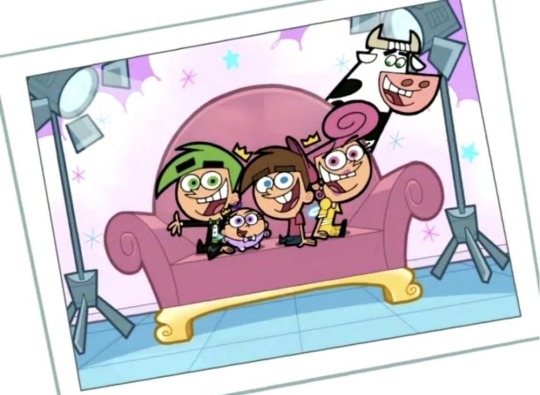
#fairly oddparents#fop#timmy turner#fairly odd parents#cosmo#wanda#peri fairly oddparents#fairly odd parents a new wish#fopanw#blues favs
131 notes
·
View notes
Text
Lily's Harley Quinn Show video is Garbage (and here's why)
We all know Lily's media hottakes are BAD. But, I feel like critics have mostly focused on her hottakes on media she hates. I've personally become more interested in what media she actually LIKES . . . Because her rational is often times even more nuts.
Well, this video made me mad enough that I'm gunna write a post about it now. Prepare your assholes for the death rattle of this DC fanboy losing his shit:
youtube
To be clear, I like this show, for some of the same reasons Lily does even. . . But that's not going to stop me from taking the piss.

(I encourage you all to watch the video in full beforehand so you can get the context of the quotes I'm pulling. Timestamps will be included though.
I just told people to watch your stupid video Lily-- can't cry copyright here.)
-0:19: TWENTY SECONDS IN, STEVEN UNIVERSE IS REFERENCED. GG LILLIAN.
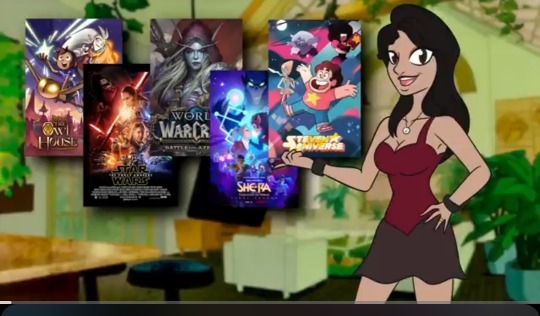
-0:36: BITCHING ABOUT HOW VICTIMIZED SHE IS. 30 SECONDS IN.
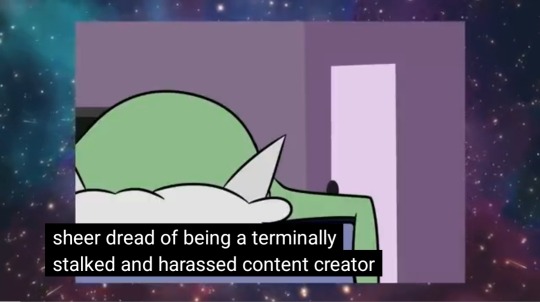
-0:55: "I dare say it's the best thing to come out of the Batman franchise in a long time."
It seems like the last thing Lily watched/played/read in "the Batman franchise" was The Dark Knight. You dare boldly, Lily. Ironically I feel like she would at least like the Lego Batman movie, if not all the other good shit that's come out since 2011. Also, this is one of the first of many times she calls the entire fucking DC Universe "The Batman Franchise."
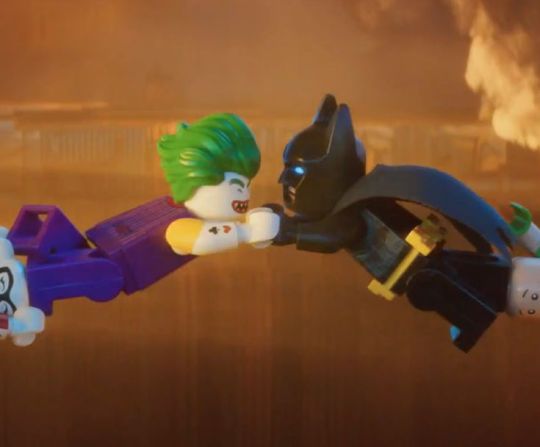
-1:00: "If you're watching this show for at all you're watching it for the romantic arc between Harley and Ivy. Don't lie."
I know this is a joke. I'm not an idiot, but. If you're familiar with Lily's general media consumption, you'll be well aware she watches shit a lot of the time for the ships and the ships ALONE. I feel like this really highlights how she views media in general in a way that's rather revealing. This video is two years old, and I wouldn't be surprised if Lily's opinion has soured a bit given the direction the show goes after this video was released. Put a pin in this comment. 📌

-1:15: "I mean it's a post-joker Harley Quinn show what else are they going to do.
Put a pin in that comment.📌
-2:00: Lily goes on to summarize the plot of the show . . . Completely ignoring all the plot beats that have nothing to do with the romance.
Put a pin in that one too.📌
-3:30: Lily indicates she identifies with Ivy.
Another pin.📌
-4:10: Lily starts talking about how near the end of the second season, Harley has now confessed her feelings to Ivy, but Ivy turns her down because she's going to get married to Kite Man (enjoy the insanity of that sentence if you haven't seen the show.)
Though I don't think she's nessesarily making any real poor points here yet, I want to point out that she really flattens the complexity of the emotions going on here. The problem is that Ivy and Harley's relationship has reached a level of intimacy where they really can't just go back to being friends. Ivy is happily in a relationship with Kite Man at this point, he's been a much more stable and reliable partner to Ivy. Though it's implied her feelings for Harley go a lot deeper. During Joker's confrontation of Harley, Lily frames it as a "go get 'er" pep talk like it's a fucking 80s rom com. He's trying more to get Harley to emotionally resolve things with her-- regardless of outcome. Ivy did say no once already. The audience expects she isn't going to say no a second time since that wouldn't be a narratively satisfying conclusion, but in the real world equivalent, she could have. The Joker wasn't telling Harley to harass Ivy until she gives in.
-5:16: Not really a mark against Lily's video persay, but in a season that aired after Lily made this video the prospect of Harley and Ivy breaking up is explored. Lily must have been seething, lol.
-5:28: "I love a good fluffy romance. I'm so fucking done with people's obsession with the nasty stuff [Flashes Catra and Adora on screen.]"
Honestly this comment has me wondering if Lily decided to check her phone or just skip through scenes where Harley and Ivy weren't being lovey-dovey. I don't know what fucking show she apparently watched (foreshadowing is a narrative tool wh--.)
-5:48: "Poison Ivy has always had the same problem a lot of female characters in DC comics have had in despite being an actual doctor they always just put her in a skin tight leotard [ . . . ] About the only notable exception to that was in The Batman [the 2005 show] where she was a teenager [classical Lily goonery inserted here.]"
Ignoring the goon comment, in isolation I don't have a grievance with this comment persay. As a generalization, it's more or less true about Ivy. She's unfortunately one of the lesser well-used characters in the various DC canons as a whole. However, Lily is going to start implying she's more familiar with DC in general, especially the comics, than she really is. I have strong reason to doubt Lily would know Ivy canonically has a doctorate in botanical sciences if this show didn't call so much attention to it. You'll see why in a moment.
Also the 2005 Batman show is far from the only iteration to reimagine Ivy as a teen. I like that show's take on Ivy too, but that's not a fucking unique spin on the character.

-6:57: "Clayface was always a random D-list monster like Carnage, but here he's reimagined as a struggling actor."
In a show that had the balls to feature Queen of Fables, she's calling Clayface a fucking "d-lister." Nevermind Carnage. But no Lily, Clayface has been a struggling actor since his first appearance in Detective Comics No.40. It's literally the first thing in his bio on his fucking wiki page.
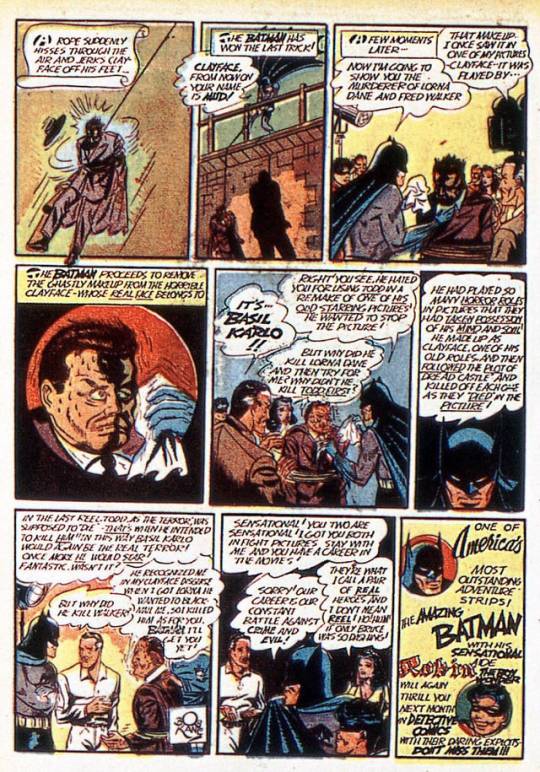
-7:09: "There's one episode where [Clayface] assumes the identity of Stephanie to get into Riddler's college [ . . . ] Seriously I'm convinced he's been moonlighting as Stephanie a lot. The other girls on campus call her 'Steph.' She's been there for a while. This is Clayface's secret identity and you can't convince me otherwise."
LILY THAT'S NOT SUBTEXT THAT'S THE FUCKING JOKE. IT'S TEXT. IT'S CANON. YES. CLAYFACE HAS BEEN FUCKING AROUND ON RIDDLER'S CAMPUS THIS WHOLE TIME. CONFIRMED IN THE SHOW. LILY. LILLLYYYYYY.
Worth pointing out too, she'd totally call Clayface's Stephanie character transphobic if she hated the show.
-9:00: "The writers though 'okay, what do we use to fill our quota of the sad misguided villian this arc-- oh I know fucking BATMAN!'"
Lily what the fuck are you doing when you sit down to watch a show for your channel? Are you playing Candycrush the whole time? Are you screaming at Mikaila that often you miss like . . . Almost everything!? What are you doin' sweaty!?
Lilian, Bruce is not the primary antagonist of the 3rd season . . . IVY IS. Or really, Harley and Ivy's emotional dysfunction is the antagonist of basically this whole series, and it's Ivy's turn to be the main driver of conflict. The person destroying Gotham is Ivy. Not Batman, IVY.
Bruce and Selina's relationship is supposed to be a conceptual foil to Harley and Ivy's. Bruce is having an emotional breakdown the entire series has more or less been building up to.
-9:15: [In reference to Batman getting sent to prison] "I want him to get some nice and comfortable therapy."
. . . Lily is that what you think happens in prison?
-9:35: Lily is talking about the Joker's step-dad arc, and this is as good a time as any to stop for a sec to talk about how Lily doesn't seem to get what The Harley Show is doing with the characters.
The thing that makes the show an exceptionally brilliant take on the DC universe is that virtually all the characters (with some exceptions, that were tweaked for the better mostly) are actually faithful to their comic book/generally established characterization. To an impressive degree, down to even just minor details. You can tell the people who made this show are genuine fans of DC comics. Their personalities and character arcs are exaggerated for comedic effect, with specific interesting angles teased out to draw focus to them. Some elements of their personality are recontextualized to create a more engaging dynamic, but regardless. Even most of the plot elements are at least loose adaptations of storylines from the comic, or other DC media. It's really impressive how the show both works as a functional take on the DC universe by itself, and as a parody of it. Lily demonstrates she's totally oblivious to this multiple times in the video, but her section on the Joker best exemplifies this.
The Joker has taken over and/or become mayor of Gotham multiple times in the comics. Lily thinks for some god forsaken reason in the 70 something years Batman comics have been printed, nobody's thought of that. THEY HAVE. The gag with the second time Joker takes over Gotham IN THIS FUCKING SHOW ALONE is . . . He's actually a really good mayor. Gotham is a perpetual capitalist nightmare shithole of a city. The most insane, radical anarchist thing for The Joker to do is . . . Be a socialist who actually gives a shit about the small folk. That's the joke, Lily. That's the joke. That's the mother fucking JOKE. THE FUNNY HAHA, THERE IT IS LILY. I FUCKING EXPLAINED IT TO YOU.
And Lilian. The Joker being at his most normal and stable while he has a family. Is. A. Direct. Parody. Of. One. Of. The. Most. FAMOUS. BATMAN STORIES. EVER. WRITTEN.
SHE IS LITERALLY FUCKING SHOWING THE EPISODE WHERE THEY DIRECTLY VISUALLY REFERENCE THE KILLING JOKE ON SCREEN. LILY YOU'RE GOING TO GIVE ME A FUCKING HERNIA.
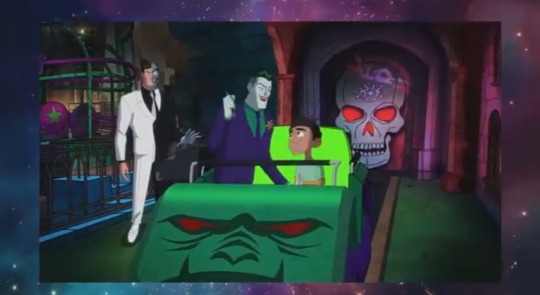
-10:10: Lily calls Sam Raimi a "douchebag."
Fuck right off.
-10:25: "It's a return to wacky hijinks that uses to define The Joker back when he was a gangster in funny makeup."
NO IT ISN'T LILY.
-11:00: Lily bitches about Harley Quinn for the 7 minutes in the remaining runtime.
Okay, the play-by-play is over, I'm going to address this section all at once because it will be quicker and more comprehensive if I do. This is the point where all the aformentioned pins come in.
Though I'm going to have to be ignoring some bullshit Lily says here in order to stay focused, I will mention first, Lily doesn't seem to realize Batfleck and Nolan's Batman were MASSIVE departures from the comics and don't pull much from the storylines. I don't think that's nessesarily a bad thing, even though I'm not the biggest fan of either of those interpretations, but for the record-- no. Those adaptations have almost nothing to do with Year one, The Dark Night Returns, The Killing Joke, or The Long Halloween outside of superficial elements. Lily just googled "famous Batman comics" and picked the four she probably vaguely heard of before. Again, she didn't even recognize the in-your-face impossible to miss Killing Joke parody episode she used as footage for this video. SHE'S JUST PRETENDING SHE'S READ COMICS SHE HASN'T.
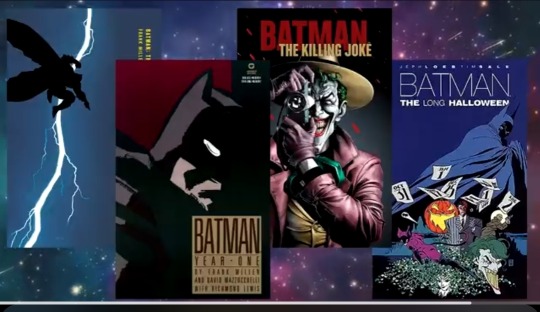
Now to the point:
Lily's rational for not liking Harley's portrayal in the Harley Quinn show is honest to god brain damage. I'm not even sure how hard I need to go into explaining this because . . . It's pointing at the text itself and calling it a flaw. Harley's entire journey as a person is TRYING TO DISCOVER WHO SHE IS outside of the toxic codependency she had with the Joker. Her arc is both a meta commentary on the nature of the character conceptually and her journey to redefine herself. THIS ISN'T FUCKING SUBTLE. THIS IS STATED IN THE SHOW. Harley's identity crisis over whether or not she's even a villan anymore STARTS IN SEASON 3. Harley's lack of inhibition is what DRIVES THE PLOT IN SEASON 2. Harley's struggles to emancipat herself IS THE PLOT OF THE FIRST FUCKING EPISODE. This is also honestly the ONLY DC property I can think of that actually bothers to do something with the fact that Harley is a psychologist. Almost on that basis alone, it's one of the most refreshing takes on the character. That actually means something when I say it, because I've actually read a fucking comic in my life. LILY WHAT FUCKING DIMENSION DO YOU SLIP INTO ANY TIME YOU SIT DOWN TO WATCH A SHOW.
That question is rhetorical-- Lily tells on herself several times throughout this video. Remember those pins? Go read em again. Lily identifies with Ivy, so Lily decided Ivy is the "real" main character-- and wants Harley to be Ivy's loving kissy huggy gf. She genuinely thinks the show is actively making a mistake anytime her smut ship fanfic is interrupted. Lily wants porn. LILY YEARNS FOR THE PORN, ALWAYS. Every single fucking time.
She's decided Ivy has done nothing wrong to create tension in the relationship. She has deemed the character flaws Harley has that creates tension in the relationship a mistake in the writing.
Because Lily has not actually read a comic, but probably has seen Batman: The Animated Series-- she's missed all of the other references and spoofs in the show except for the ones involving Harley. That was the show she was originally created in.
Case-fucking-closed. Water is wet, the sky is blue, and Lily Orchard is talking out of her ass.
Kill my parents and call me the world's greatest detective, I guess.
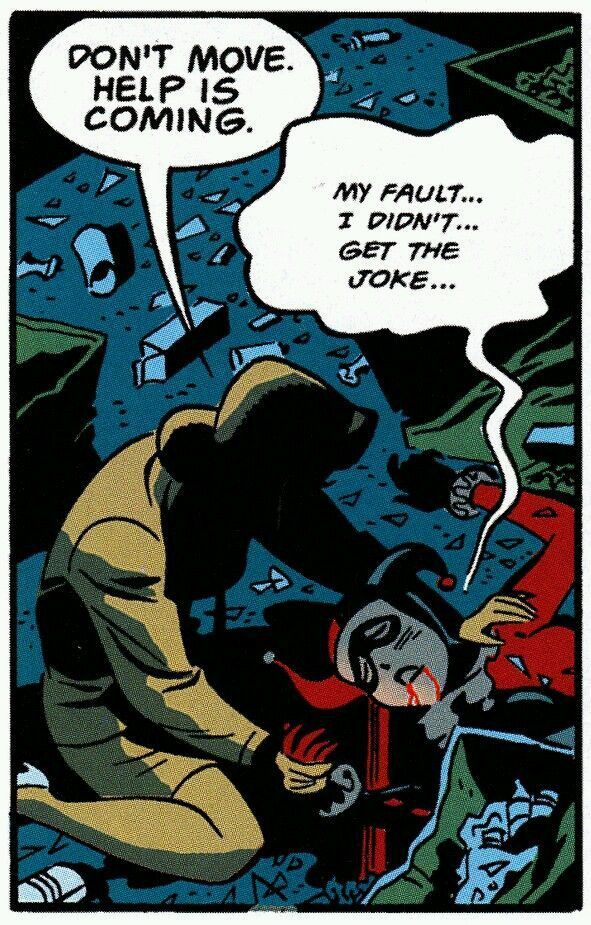
#Youtube#lily orchard#lily orchard critical#anti lily orchard#lily peet#lorch posting#lily orchard stuff#youtube#eldrich lily#liquid orcard#lily orchard receipts#lily orchard is a bad critic#lily orchard is a bad writer#lily orchard is a creep#harley quinn#harleen quinzel#posion ivy#batman#batfam#dc comics#dcu#dc universe
62 notes
·
View notes
Text
satoru tries to keep it from you, as if your reach in the court isn’t threaded more firmly even than his own. as if the royal guards do not prefer your company to his, as if you’re such a fool you wouldn’t notice how he’s come to bed long after you’ve gone to sleep every day for the past week—he tells you it’s dull financial advising, you know it’s because he’s been busy torturing a man. an assassin, you’ve been told; a poisoner who hadn’t even made it out of the kitchen before being caught.
you also know he’s back earlier tonight because he’s executed another man—the one who hired the hit, one of his own cousins. ordinarily such a thing would be dealt with swiftly, except that the food found dosed had been not your husband’s but yours, and your king does not take kindly to threats against you. the maids had told you all of that days ago; it’s the guards that tell you he assembled the court without you, hours past sunset, and made a display of cutting down his own kin for your sake. ruthless, they tell you, savage, lest there be any doubt in his affections for you.
he comes back to your shared bedchamber without a drop of crimson on his clothes, but the satisfied air about him and the heavy drum of bloodlust you can see in his eye tell you that your information is correct. still, you greet him casually and don’t bring up your discontent as he removes his blindfold and makes himself comfortable on the bed, unabashedly peering at you while you sit at your vanity pretending to ready yourself for sleep. he’s silent with his staring, and you are silent as well, busy ruminating on how you’re feeling until you come to the conclusion that the only action of his which has sparked your ire is that he has chosen not to share them with you—no, you’re not bothered by his barbaric display, but rather that he did it without informing you. with your opinion found, you are ready to initiate the conversation.
“so?” you begin casually, gaze flitting up to meet his eye through the mirror. “are the conspirators dead, then?”
at first he gives no response, but when you turn in your seat to face him he rises to stand and strides over to you. lacing his fingers with yours, he pulls you to your feet—holds you close, leans down to press his forehead to yours.
“can’t get anything past you, hm? not with your brain.”
“well, are they?”
“yes. of course. they’ve hardly earned the title of conspirators frankly, not with that pitiful display.”
“mm.” you purse your lips and pull away, turning your back on him. “lovely to know that you’d accept my death if it were at the hands of a competent man.”
he follows you swiftly, eases his arms around your waist and rests his chin in the crook of your neck. his tone is easy, light—amused, perhaps. “i don’t believe i said anything of the sort.”
“i do not find this amusing, my king.” despite your tone, you reach up to thread your fingers through his hair, drawing a contented noise from him which he buries into your nape. “i’m displeased by you.”
“are you, now?” his lips quirk against your skin, and he shifts, his whole body moving so that he can trace kisses along your jaw. “i’ll simply have to please you, my queen.”
“satoru.” the name makes him pause. you tighten your hold on his hair, pull him to rest against your shoulder again in an attempt to halt him. “you killed your kin for me and attempted to hide it. did you truly think i wouldn’t find out?”
“not this quickly,” he grumbles, petulant, entirely unsuitable for a king who had just slit the throat of his own cousin before an audience.
“people chatter, especially when you require the attendance of the entire court. but since we are being honest, i knew of the whole ordeal the moment it happened—i do believe i was made aware of the poisoning before you were, my husband. so tell me, why did you torture a man for a week and choose not to inform your wife? why did you so courteously invite my companions to witness this execution but neglect to extend that invitation to me?”
he doesn’t speak for a moment. his breath comes hot against your neck, not quite a sigh but certainly a deep breath—then he turns his face into your hand, leaves a fleeting kiss against your palm, and lifts his head.
“they need to learn, hm? how would they have learned if i’d let this go?” his eyes are manic, the closest you’ve seen to what they’d been that night—yet the moment they meet yours they soften, reverence seeping in. he stands to his full height behind you, hand coming beneath your chin to tilt your face upward so that he can loom over you and press a kiss to your brow; he’s gentle with you, but the steel at the core of his tone is more than palpable. “i won’t show mercy, certainly not when it comes to those who wish to harm you. you cannot ask me to be forgiving with such things.”
you realize with those words that he believes you’re balking at the brutality, that he thinks you timid and soft. he thinks you don’t know what he does to maintain his power, as if you’re not intimately aware of the monster he’s had to become—as if you hadn’t come face-to-face with it, with his blade.
you think you probably shouldn’t be as endeared as you are. you certainly shouldn’t turn around, wrap your arms around his neck, and tug him down into a real kiss to reward his actions, yet you still do. it’s addicting how quickly he melts to your affections; you know how intimidating his size must be to so many but it’s impossible for you to fear it when he’d drop to his knees for you at a single word.
when you pull away he doesn’t let go—he whines at you, a wordless protest, and buries his head into your shoulder to nip at your skin.
“i’m not angry with you for refusing mercy,” you mutter to him, “i’m angry with you for lying to me. i am your queen, your partner. you will not do this again, you will tell me the next time you intend to cut down a man in my name.”
he pulls back and opens his mouth, eyes wide, but you cut him off by lunging upward to peck at the corner of his lips.
“it’s in your best interest to comply, husband. you cannot hide things from me.”
“i know, wife.” his sigh is love-struck. “i’m a fool to have tried.”
usurper!gojo masterlist
#gojo x reader#gojo x y/n#gojo x you#gojo satoru x reader#gojo satoru x y/n#gojo satoru x you#jjk x reader#jjk x y/n#jjk x you#mine.🌧#char.🌧 gojo#usurper!gojo
770 notes
·
View notes
Text
Idk if I've said this before but Buck's season 4 arc is so fucking interesting and the way they CHOSE to have it essentially "completed" in the finale by Eddie is so intentional and beautiful AAAAAAA
So basically we open with Buck in therapy, this leads to his parents coming and Buck begins and such, where Eddie is consistently there for Buck to go to, and we have the iconic "I know you did", where we as the audience see how much Eddie understands this side of Buck, and how Eddie gives Buck the space to talk and to be angry and process without pushing him to be anything else (which contrasts to Maddie this season, though I love Maddie and I don't think the effects of her childhood on her have been given enough time in the show).
And he doesn't properly finish this self sacrificing thing here, when his mum says "you're doing what you were born to do" this is exemplified, and Buck is affirmed in his purpose being the saviour.
And then we have a kind of cyclical arc with the shooting, where Buck has to confront again how he feels like he's a shitty replacement for something, and that he's reckless and he immediately reverts to his learned perspective of "I shouldn't be here and someone else should and I now I have to make sure that it's only me that gets hurt" that he picked up in his childhood, even when not knowing about Daniel. But this time Eddie stops him, and he tells him that he's not expendable, and that he has a family who need him, and that he has a permanent place in their life.
Which is literally all Buck has ever wanted.
ALSO the conversation with Bobby in 4x14 is so interesting because it feels like there's something missing, when Bobby only reprimands Buck for being reckless and is so nearly at the point, which is that Buck does not value his life and he needs fucking help, but he MISSES it, and the audience sees that, and the scene feels incomplete, and this is simply because they wanted to save that line for Eddie. ANYONE in that episode could have pointed it out, have been given that line, because it was obvious to the audience what Buck was doing. And the writers very deliberately let our frustration at the other characters for missing it build, so that the will conversation was massively highlighted and very narratively satisfying and conclusive.
It has been SO intentional and I am obsessed with it so much
#911 abc#9-1-1#eddie diaz#9 1 1#buddie#evan buckley#jwpyyy#911 show#911 season 4#analysis ones#faves
70 notes
·
View notes
Text
Back in May I bought Khemjira's Rescue on meb, happy that there finally was an official English translation because I love horror and actually liked the first pilot teaser for Spirit Reborn - even though it wasn't well received.
I now know why the teaser wasn't well received (the official version has since been deleted and there's only some re-uploads left) and I agree. Khemjira isn't really a classic QL where the story centres around two people falling in love. It's a horror novel first (and the novel's content warning is very open about this). Much of the romance only happens in the bonus chapters. It's also steeped in Isan folklore and Theravadin Buddhist teachings and virtues, with heavy and uncompromising themes of karma, rebirth, right action and non-attachment (which I really appreciate but might not be everyone's cup of tea because it completely ignores concepts of justice and revenge).
The novel itself is translated really well with only a few editorial slip-ups but tons of footnotes to explain potentially unfamiliar concepts and give translations for the recited khatha. The bonus chapters are plentiful and rewarding if you're into romance and the usual level of BL novel spiciness, but even without them the narrative flows really well and comes to a satisfying conclusion. I really liked the novel - it might be my favourite right after I Feel You Linger in the Air - so I was slightly apprehensive when Mandee announced that they had acquired the rights for a new adaptation.
I don't know the actors at all so I only have the novel to go by, but all in all I'm really happy with Mandee's pilot teaser. It's so close to the novel that even seemingly short filler scenes are recognisably taken from moments in the story. And while I still think Keng Harit is a bit too young as Por Kru Parun, he manages to capture his commanding and alluring presence very well.
My only worry now is that they'll downplay the religious themes in order to elevate the romance between, well, basically everyone. I couldn't even blame them though, because most of the audience will be expecting romance, and the series probably wouldn't be very well received if both couples remained chaste until the very end. I don't think Khemjira's Rescue even qualifies as slow-burn for reasons I'll explain a bit later (and behind a spoiler warning).
But first, a bit more about the main characters because I've seen some confusion about their names etc. I'll keep these as spoiler-free as Mandee's pilot teaser was so if you've watched that then you're all set.
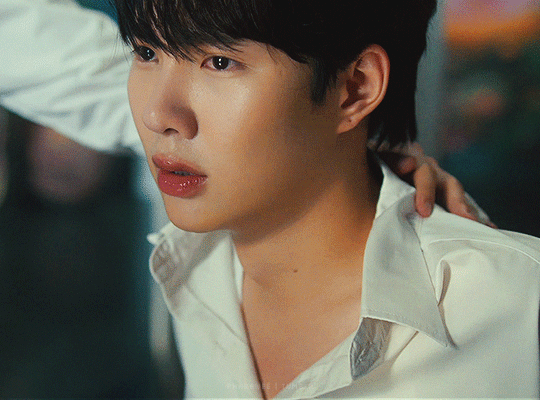
Khemjira is cursed, as are all male descendants of his family, doomed to die before their 20th birthday (the series changes it to 21). His mother gave him a traditionally female name to confuse the curse but to no avail: as he grows older he's more and more troubled by the heavy and malevolent presence of spirits. These are kept at bay by an amulet given to to him by a venerable Por Kru (a practicioner of Buddhist white magic) but when that's no longer enough, his friend Jhet introduces him to his teacher Por Kru Parun who lives in a small Isan village. Despite the burden of bad karma, Khem is a good person who always tries his best even when he feels like giving up.
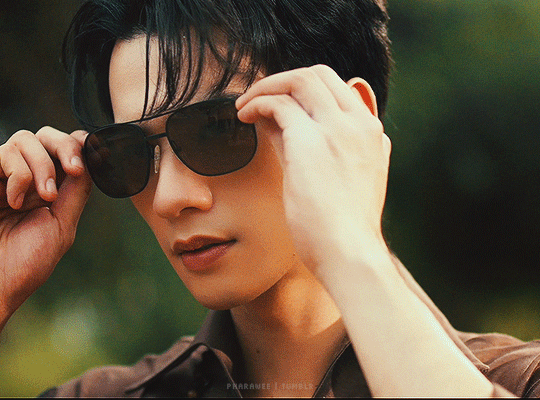
Por Kru Parun (the series calls him Karan) is a respected practicioner of Buddhist white magic. He lives in a traditional wooden house outside of a small Isan village and protects his community from spiritual harm. He learned from his grandfather (who was himself a respected Por Kru) and also spent many years ordained as a monk. Because he lives by the precepts (which go beyond the five precepts of laypeople) he seems detached and aloof, often wearing dark sunglasses so others won't get charmed by him. His real (nick)name is Peem but he only starts using it with Khem once the two get romantically involved.
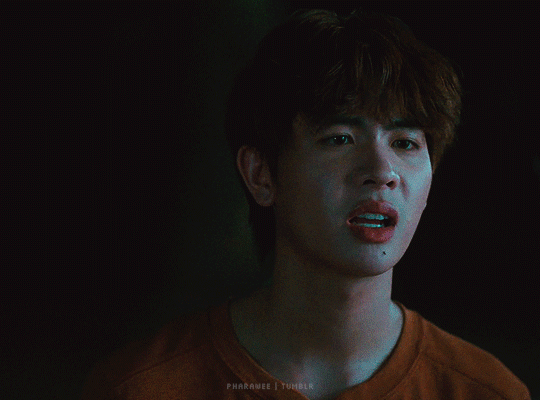
Jhettana and Charnvit (aka Jhet and Charn) are Khem's best friends. Khem meets Jhet during freshman orientation when Jhet senses the malevolent spirits around him. It's also Jhet who suggests visiting his teacher Por Kru Parun in his home province. They do this during a university excursion. This is how they meet Charn who's part of the student trip and very suspicious about what they're doing. Charn is extremely polite, addressing everyone as Khun. He wears glasses to aid his bad vision. Both Jhet and Charn are extremely protective of Khem, choosing to become Parun's students in order to help save him. They're also the secondary couple with a surprising past connection.
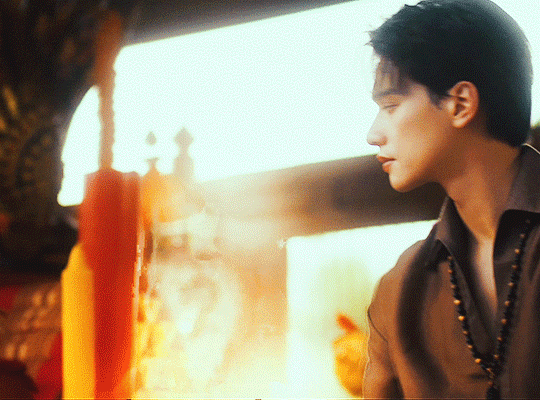
These two boys are Thong and Ake, Parun's spirit servants. They're the ghosts of 12-year-old twins that already served Parun's grandfather. They also have a surprising role to play in things to come.
SOME SPOILERS FOR THE MIDDLE OF THE NOVEL
As for why the romance can only happen after Khemjira's curse has been lifted: as practitioners of white magic, Parun and his students Jhet and Charn have to adhere to the precepts. These include abstinence from unchastity, so they should remain non-attached to thoughts of sexual and romantic nature. If one of these precepts is broken, all of them are considered broken (which makes it impossible to practice white magic) - Khemjira's rescue would fail if any of them got involved romantically. Parun knows that he's mindful enough to remain non-attached until the curse has been dealt with. He also knows that he can't expect the same of Khem so he refuses to take him as his student (which is fortunate because that way we get to read about Khem's pining).
And beyond the horror and the romance, there's also a third element that heavily features in the story: rebirth. All of the characters' fates are interwoven through several past lives, and I'm really curious how Mandee will decide to tackle this added layer of complexity and identity. In The Sign, Idolfactory used the same actors througout every past life (while 1000 Years Old used different actors with the same identifying birth mark). In Khemjira's Rescue the past identities of some of the characters are incredibly important and I'd hate to see them getting erased by using the same actors to better fit with BL marketing. It was so rewarding to find out that Jhet and Charn were starcrossed lesbian lovers in a past life and I'd love it if they kept that reveal for the series as well.
Oh, and also? Yes, there's going to be at least one naga. 🙌
END OF SPOILERS
Ultimately, if Mandee truly commits to playing the long game and doesn't simplify the story in order to appeal to marketing opportunities, this could end up being one of the best Thai BL series to come. From what I saw, the actors can definitely pull it off, and the fact that the 11 minute long trailer focuses so much on novel-accuracy is very promising already. Just don't have Parun and Khem get it on too early. Sometimes you have to keep it in your pants for a bit in order to save the day. 🙏
#khemjira#khemjira the series#khemjira's rescue#keng harit#namping napatsakorn#thai bl novels#jane watches stuff#if you loved the ifylita novel and aren't fazed by horror you'll love this too#some of the themes are quite heavy though#(probably not as much if you're familiar with buddhist teachings)
90 notes
·
View notes
Text
Why Allura's Death Was Unsatisfying
You know, I think the reason Allura's death was so unsatisfying was that there was no buildup or closure to it.
I've been thinking about. Major character death isn't new to audiences, and it can be done well. It's sad, yes, and not wanted by most means, but it's possible to have it written in a way where it not only
makes sense, but
delivers closure to both the character and the story
So how do stories do this? I've found the biggest way is through buildup.
We as the audience already know, or at the very least have a feeling, that this character is going to die. Maybe they are destined to die by prophecy, or have some sort of illness that has no cure. Whatever it is, we have the suspicion that this character might not make it to the end.
Another thing is that when a character dies, it serves to wrap their character development and personal arcs. They have grown to be the most ideal version of themselves within the confines of the show, and now they're moving on.
This is satisfying to the audience. It makes sense.
Allura's death has neither of these things.
There was no buildup to her death. For a majority of the show, fans expected Voltron to end with all of the seven main characters alive, because there was no need to expect otherwise. The writers did not give us a sign that someone might possibly sure. So when Allura dies at the end of the show, it's sudden, and it feels almost abrupt in a way.
It didn't wrap up her character arc. Now there's a lot of controversy on whether or not characters even acted remotely like themselves in Season 8, and I'm not going to get into that. It was clear though, that Allura still had a lot growing and learning to do, what we were meant to interpret after the show's ending. She also never really got the chance to be a leader or avenge her nation the way she wanted to. Sure, she defeated the Galra Empire, but she still needed to rebuild Altean civilization and fix what the Galra had destroyed for the entire universe. She doesn't get to do any of that.
In conclusion, Allura would have been better off as a character had she not died, OR, they should have written Allura's arc differently in a way that it would make sense for her to die. She simply had too much to look forward to after the events of the show that nothing of her personal arc got tied up with her death.
Free my poor girl she did nothing wrong.
#voltron#essay#in this essay i will#tedtalk#vld#voltron legendary defender#allura voltron#voltron allura#discourse#vld allura#allura vld#princess allura#hot take#voltron season 8
40 notes
·
View notes
Note
Hi 👋
I just wanted to tell you that your art and au's make me smile 🩵✨ what's your favorite work of art that you've created this year?
thank you so much! ; w ; that makes me happy! and i think maybe my favorite thing was the swanatello finale? / just the au in general! i didn't make the entire thing in 2024, but i did finish it this year, and it felt absolutely insane (in a mostly good way...!) to actually finish the project... i miss it a lot sometimes, but i'm really happy with how it ended and would much rather give a story a satisfying conclusion than drag it around like a popular tv sitcom on it's 11th season, if that makes sense.

thank you!!!! ; w ; this makes me happy and i'm glad you like it!!!!! i need to make more clover crown content... soon... it's coming... i promise... @arelenforyadarlin

thank you! ; 0 ; i'm very glad that i did it justice! i am pretty forgetful due to my adhd, but i also tried to do a lot of research along the way about more pervasive memory issues more akin to what donnie was dealing with, so i'm very happy that it all came across well...!

you guys all have permission to stab gemini!big mama if you ever see her <3 also thank you!

i work at a 3D printing company! i do all the silly administration and paperwork stuff, and, despite failing math in high school, some of the accounting stuff, too.

i KNOWWW, they're stealing my fucking brand :/// feels legally actionable to me tbh. they'll be hearing from my lawyers... @thejade-forest

THE GEMINI TWINS CAN DO IT AND THEY BELIEVE IN YOU-- YOU CAN DO IT, TOO!!!! also shaking ur hand re: period-related medical issues and suffering. also training in MMA is incredibly badass?! :000 NICE.

Technically speaking, no. However, the Hidden City Police did find the twins just wandering around the city-- and since she's got, like, 80% of the police force on her payroll, she of course heard about it right away... @serendipitous-posts

GOOD JOB NAILING THE PRETEXT :D I'm glad my silly lil AU was helpful, hehe :3c

I'm originally from Massachusetts! My favorite color is pink and I've been making art for most of the my life. One of the main things driving me is that I just really love stories and characters and wanna force people to pay attention to all the silly lil situations happening to make-believe people in my head. Don't think I could pick a favorite fanart, since they are all so beloved... ; w ; Any version of Donnie is my favorite. I wanna go live in the Pokemon World, I think I try to find a healthy balance between 'doing my own thing' and 'is there an audience for this content?' Also! Great question! Uhhh... for TMWN, what truly started me on that road was that I Didn't Wanna Have To Draw Turtles. For the Gemini, I was very much inspired by the Even More of a Disaster AU! And for Swanatello, as I've stated in the past... I just wanted to make a silly donniesona with a pun for a name... and then things got out of hand... @sweetnsoursinger

nooo don't ooze my tortoiseeee i'm not ready to be a parentttttt i don't wanna live in the sewerssssss noooooooooooo-- @thebloodyheartgirl

emd two is way less insufferable than one--
(it's more like... two and donnie have a lot of common ground with science and mystical studies, so they are capable of getting along pretty well...! and leo automatically feels some sense of protection and affection for two just because... well... he's a version of donnie!
but. uhhh. one... not so much. it is... complicated...)

it was FINE... i mean. it SUCKED, he didn't LIKE it, it took the whole ass day and was painful and exhausting and scary. but there were no huge medical scares or complications or anything, so in the grand scheme, it went pretty smoothly? not that they had much to compare it to...
leo's went WAY smoother though, much quicker and easier than donnie's, (plus just one egg!) and donnie was so fucking annoyed at him for it. @jollycrowntragedy

It's based on their actual genetic/physical ages, for the most part! For Mikey and Venus, Draxum already knew exactly how old all of the turtles were when he got them, (he's a scientist, for goodness sake,) so he could roughly translate that into their 'post-mutation' ages, with Mikey being a bit older. For Raph, Leo, and Donnie, it was a lot more guesswork based for their respective caretakers... The fact that Donnie is the 'older twin,' for example, is completely arbitrary.
Jeni joined the Draxum family at a later date than the rest of the turtles and wasn't present during the original mutation process. She was mutated and 'adopted' as an infant about two years after the initial mutation event-- when Mikey was around three and Venus was about two. @kingofgemini

I do! Here's a post I made previously about the comic making procress for Gemini-- some things have changed a little since then, but most of it is pretty much the same...! If you're looking for the textures specifically, I'd check out the link I've got in the bottom for True Grit Texture Supply, which is where I got a bunch of my brushes. (If you sign up for their email list, then they'll send you a bunch of brushes for free, including a lot of the ones that I use in my comics!) @avisminutia

THANK YOU... ; _ ; THIS MAKES ME VERY VERY HAPPY... I AM GLAD...
#asks#long post#cw pregnancy#cw pregnancy mention#cw menstruation#cw menstruation mention#anon#still hoarding a bunch of clover crown asks that i wanna answer with art at some point...
42 notes
·
View notes
Text
Does anyone else think Stella and Fredrika got done dirty in season 3?
I know they're generally not that well loved in the fandom anyway and while they have their bitchy, gossipy moments they still weren't actually "mean girls" imo and had their sweet, nice moments too. They genuinely love and care about Felice and they also did more than just tolerate Sara while she was a part of the friend group. They both got more depth in s2 that emphasised Stella's and Fredrika's bond as best friends and we got a cute wlw subplot that made sense as progression from s1.
But in s3 it felt like they were just relegated to the rich, spoiled girls with no real character growth. They were sort of trying but were rather insensitive and not understanding overall towards Felice's feelings and situation regarding her friendship break up with Sara and her racism experiences she told them about. They kind of pressured Felice about the hillerska investigation and were mad the truth came out and yelled at her about it in the finale.
That being said, I'm not hating on them, I just thought it was sad that they were presented as being not good and true friends and apparently ones Felice should ditch and the only true friend at the end appears to be Sara (which also does Madison dirty but let's not get into that). I would've loved to see them growing and learning more throughout the season (maybe also reconcile with Sara) and actually taking these allegations more seriously and understanding the problems in the system including racism and classism and maybe taking their time into questioning and unlearning their own behavior or that it at least hints at that. But they seemed to have ended the show with no proper reflection and indication they have evolved and learned anything.
What was especially disheartening that their own wlw story also got shortened and barely had any progression throughout. The kiss in the finale came kinda out of nowhere, there was no build up to it, their feelings were never addressed, the last time was Stella to Sara at the valentine's ball in s2 but we knew nothing about Fredrika's (except for one little jealousy moment i guess) or even if Felice had any idea about this.
Those were things that could've been elaborated on in s3 and would've made sense to do, instead that kiss scene between them felt like it was put there last minute as if they've almost forgotten to include them and then gave us one small scene that barely lasts 10 seconds that's not even shown from their perspectives and decided that's enough, we let the girls kiss, it's a happy ending, perfect, done. It didn't feel earned and there was no communication or growth (similar to wilmon), it was just another quick wrap up to ensure they're endgame to satisfy the audience.
Now I am not demanding they should've gotten endless amount of screentime, nor was I expecting it. I know they're side characters and their screen time is limited but s2 was proof you could still create significant and meaningful subplots and give them some time to bloom without taking up too much from major arcs. I know some people might disagree but a show always benefits from developing their side characters more and allowing them to have a place and have depth and growth. And yr had done that beautifully before and they didn't feel like one dimensional characters but more complex. It is possible to give them a satisfying arc and conclusion without sacrificing a lot of time for it.
S3 made Stella and Fredrika feel like mere plot devices for Felice's arc to get to the point of her realising they're not genuine friends and dump them. They were not treated with the same grace to be allowed to have time to learn and grow within and outside of their romance story and it's upsetting because I like them and I want to like them and I wanna be able to talk about them without having to justify myself and see people hating on them or calling them "evil".
I think they are more than that and were generally presented as more than that. It's okay if they are also the 'bitchy, gossipy' ones but I wish they didn't just stay the 'rich, spoiled, mean' girls in the end and nothing else. S3 made it more difficult instead of less to be sympathetic towards them and that is not the development I wanted for them in the show and in terms of their role in the fandom.
#are there people who actually liked them more in s3 and liked their arc this season? i would love to know#i haven't seen more people hating on them since but i also haven't seen more love and interest towards them#i just wish I could enjoy their scenes in s3 bc i want to but well :/#young royals#stella young royals#fredrika young royals#stedrika#young royals season 3#yr s3 criticism#mine#yrtalk#part of why they felt cut short could be that felicia was filming apoy at the same time where she has the main role#probably why stella was 'sick' in ep5#still disappointing though that there was so little elaboration after what they established in s2
15 notes
·
View notes